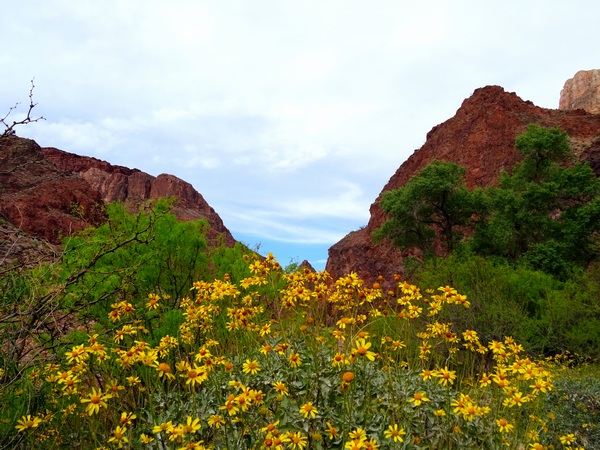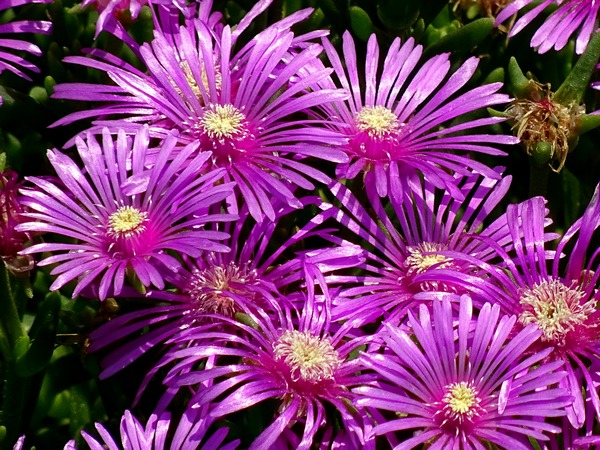
Shopping by bicycle is quite the joy.
Enjoying . . .
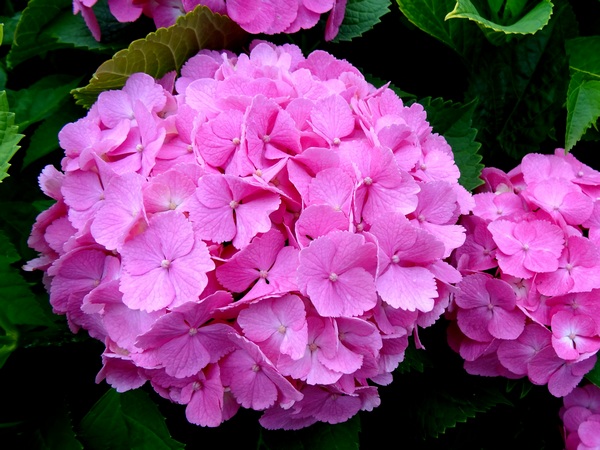
. . . the neighbor’s gardens.
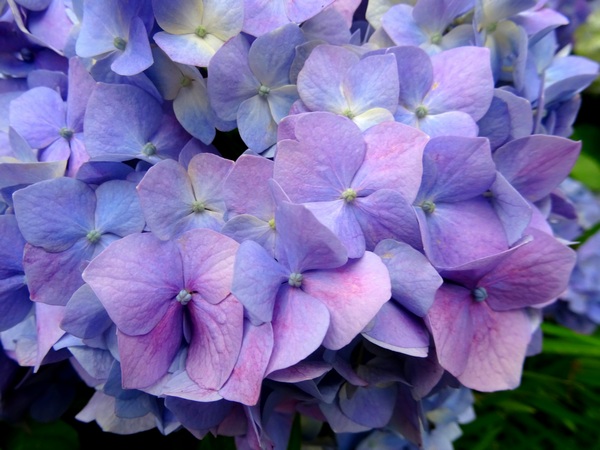
Waving to the neighbors.

Saying hello.
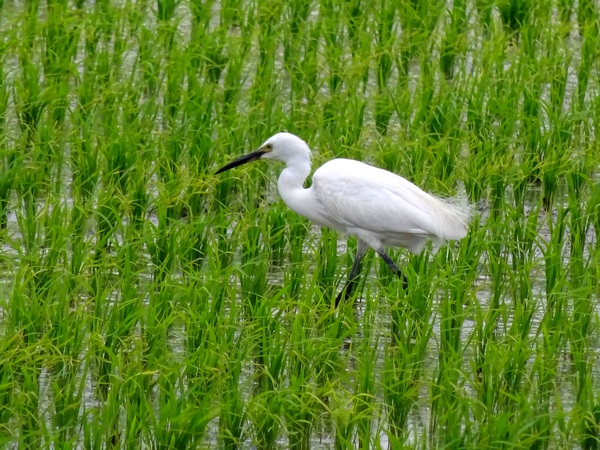
Picking up a few things at the store.
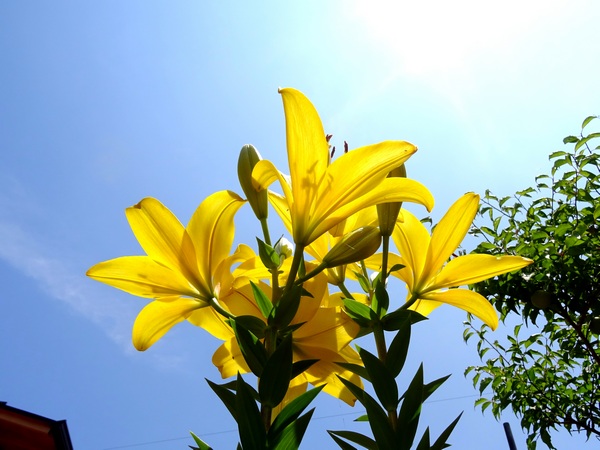
Then coming home.

Shopping by bicycle is quite the joy.
Enjoying . . .

. . . the neighbor’s gardens.

Waving to the neighbors.

Saying hello.

Picking up a few things at the store.

Then coming home.
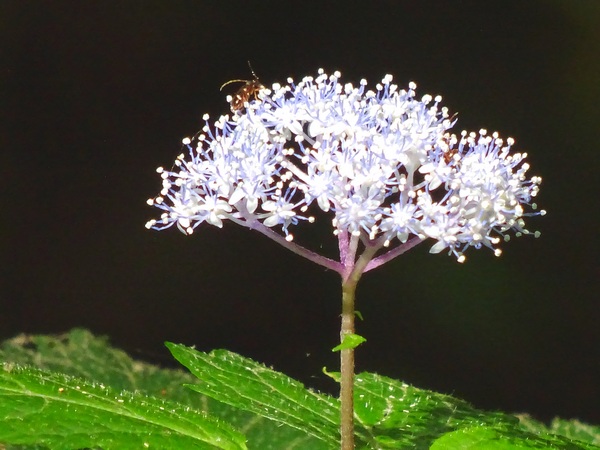
June 4th.
We Hearty Hikers went to Ryuso Mountain because we wanted the exercise, we didn’t have enough time to get up to Umegashima, and well, because we missed Ryuso a bit.
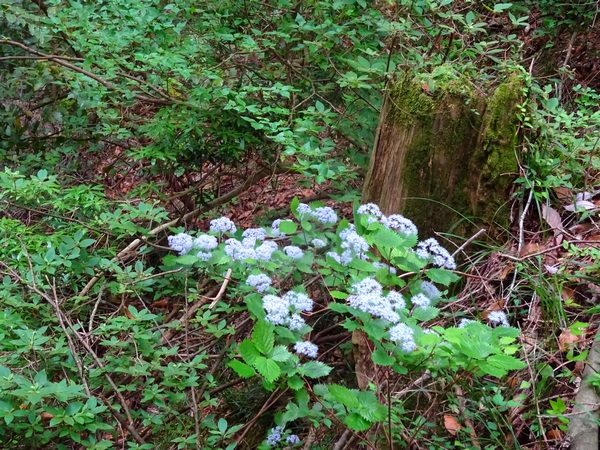
We didn’t really go to check out the mountain hydrangea. But that’s what ended up enchanting us—me, anyway.
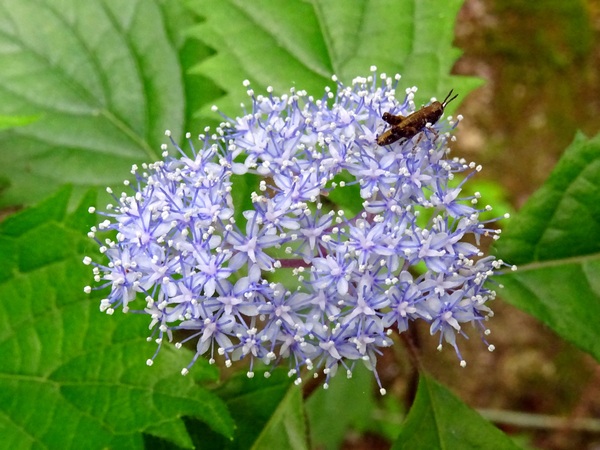
From what I see on the Web, all sorts of folks, at least those here in Shizuoka and around my home state of Georgia, are enjoying the hydrangeas. Rightfully so. They’re lovely. I’m enjoying them, too. Like these, below, which I spotted near the river at the back end of Senna, heading up toward Ryuso.
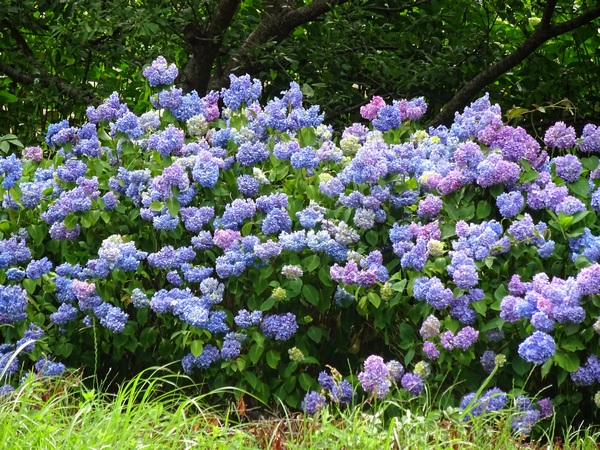
But I prefer the mountain hydrangea. The blossoms are not as big and global and they don’t grow as profusely as they do on the bushes dotting gardens all over town—but that’s sort of what I like.
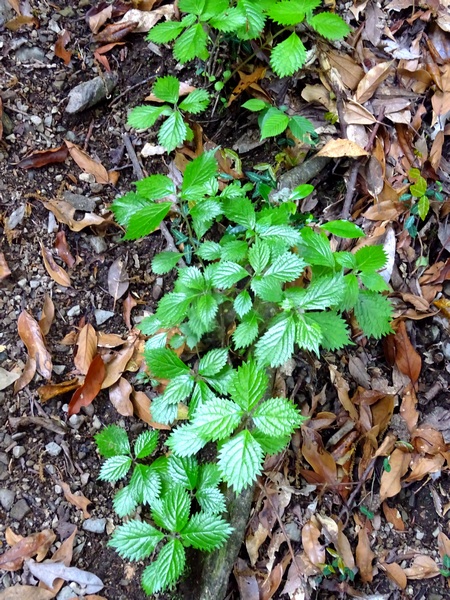
Komorebi. This is a Japanese word that I like a lot. It means, more or less, sunlight filtering down through tree leaves. I’ve never met a hiker who didn’t love komorebi. At times, there’s nothing better for a hiker than to get out of the full shineshine and into komorebi.
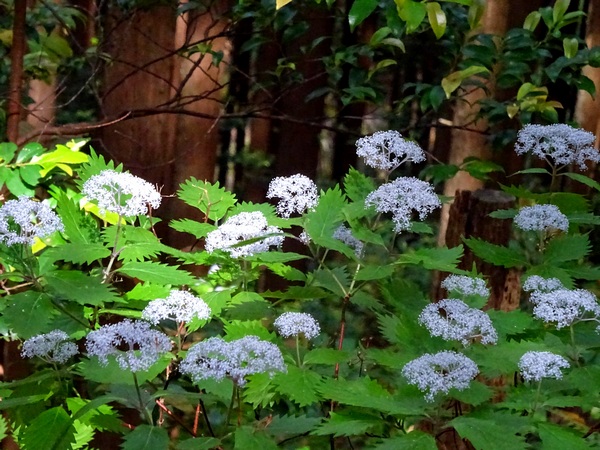
And the world of komorebi is the world in which the mountain hydrangeas live. Their limbs bend and twist and reach for the sunshine, but in the end, they just don’t get as much sunshine as their relatives down in town. Maybe they wish they could get more. Maybe they don’t.
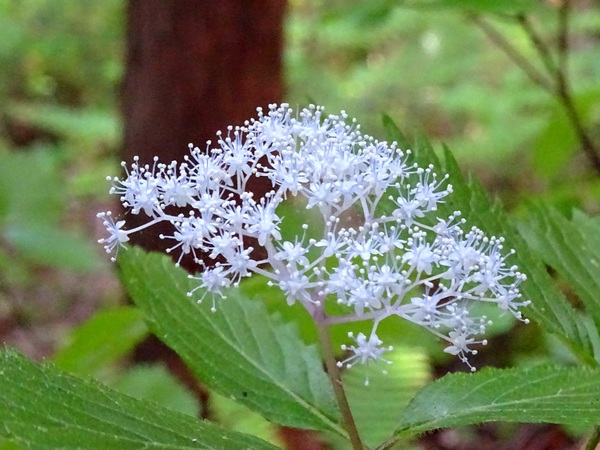
Regardless, you can feel the effort they make. And you feel the pride they feel in what they’ve made of the limited sunshine available to them. You can see that beauty is not always bigger and brighter. And you see how beauty appreciates whatever light does shine upon it.
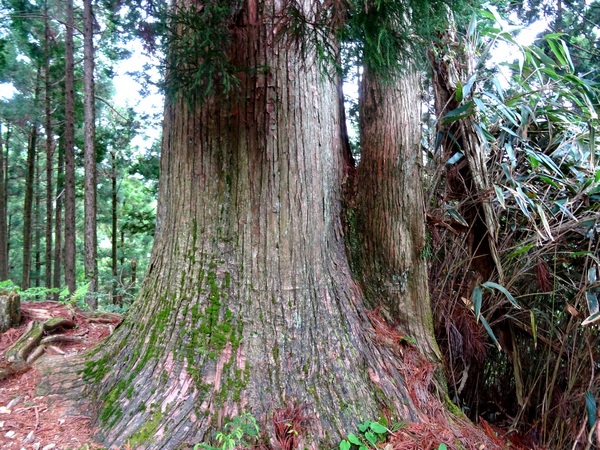 The cedars are always there, up on Ryuso. Go ahead, try to knock this guy over.
The cedars are always there, up on Ryuso. Go ahead, try to knock this guy over.
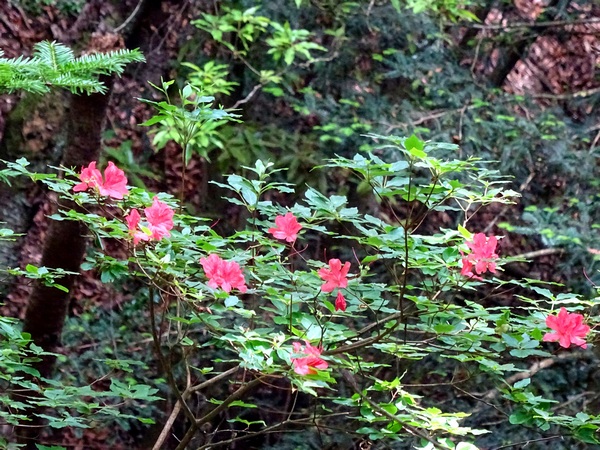
The peachy-red azalaes know all that the hydrangea do.
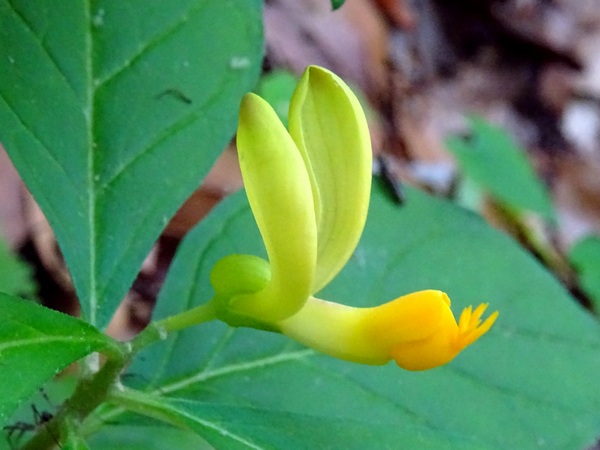
These yellow guys (kakinohagusa), too, were doing pretty good in mostly shady spots.
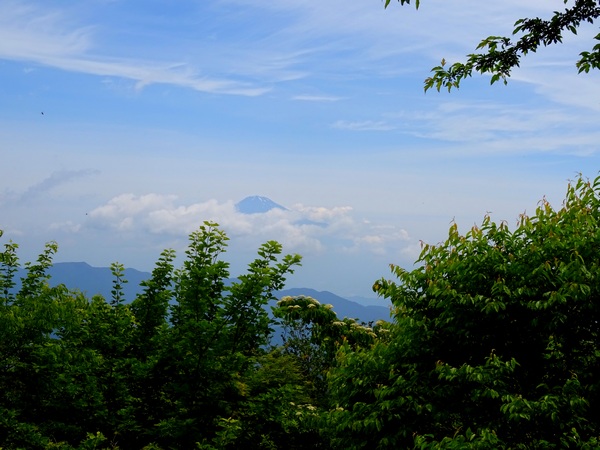 The leaves were all out—so our buddy Fuji-kun was only visible from one or two spots. Float on by, Fuji-kun!
The leaves were all out—so our buddy Fuji-kun was only visible from one or two spots. Float on by, Fuji-kun!
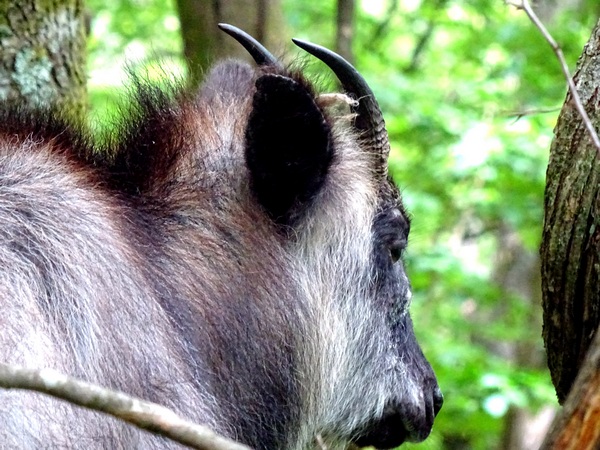
As we started down, we ran into this fellow. At first, he seemed a little shy, and kept a couple of strides ahead of us.
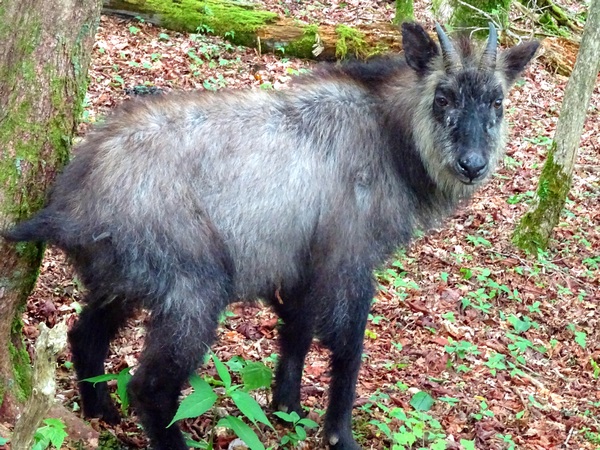 But finally he turned back to us. Seemed willing to introduce himself.
But finally he turned back to us. Seemed willing to introduce himself.
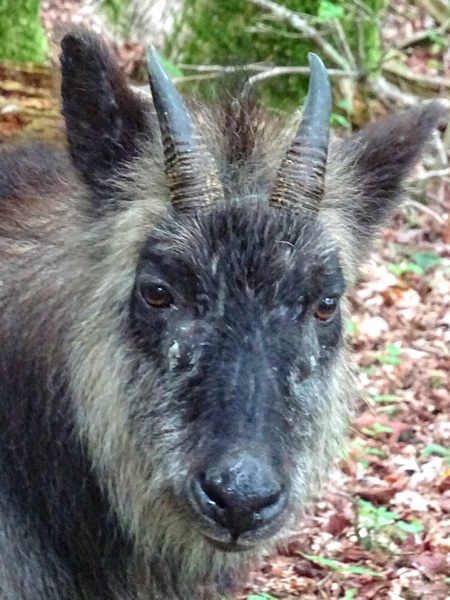 “We good?” he asked.
“We good?” he asked.
“Yeah,” I replied.
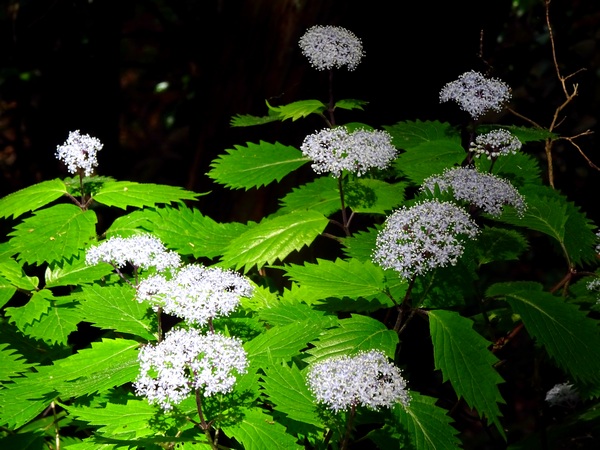 Most of the hydrangea we saw in bloom were on the lower half of the mountain. Further up, they should be blooming over the next couple of weeks.
Most of the hydrangea we saw in bloom were on the lower half of the mountain. Further up, they should be blooming over the next couple of weeks.
If you have the time . . . 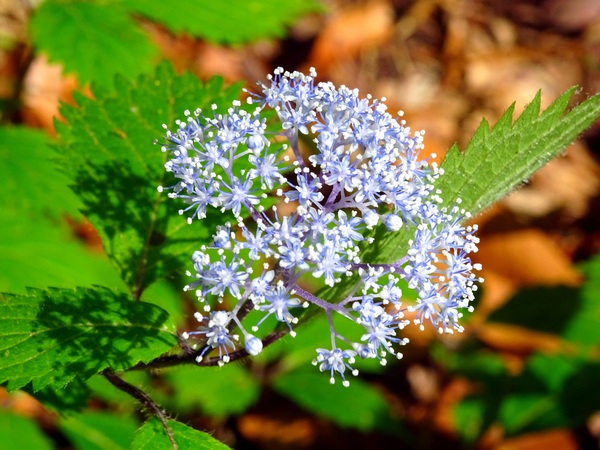

I have a complex.
About weeds.
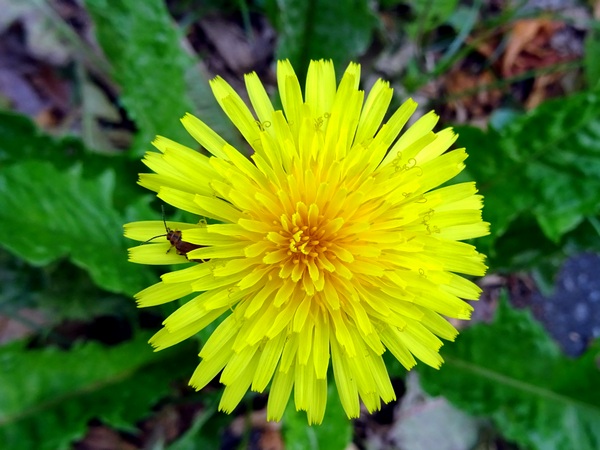
Or rather, about the word “weed.” It seems to me that sometimes we assume that a weed has some sort of “weediness” at its heart, but of course, a weed is nothing more than an inconvenient plant—a plant inconvenient to us.
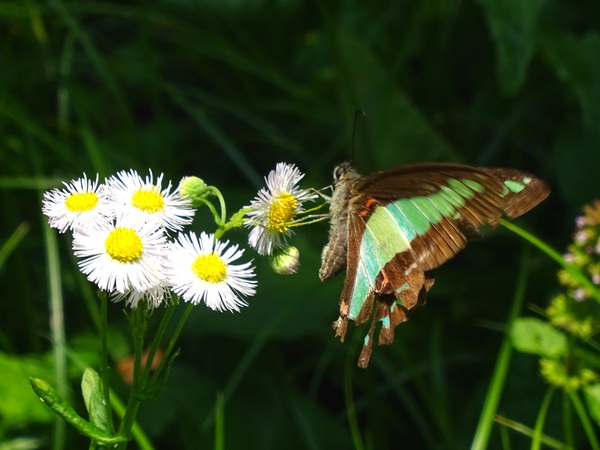
Us, though, is really me and you, and me and you don’t always agree on things, so this creates complications when it comes to deciding whether or not to call a plant a weed.
Some plants in my garden I find convenient to call weeds, and when I find them, I’m quick to “weed” them—though you might wonder why I was pulling up such wonderful creatures.
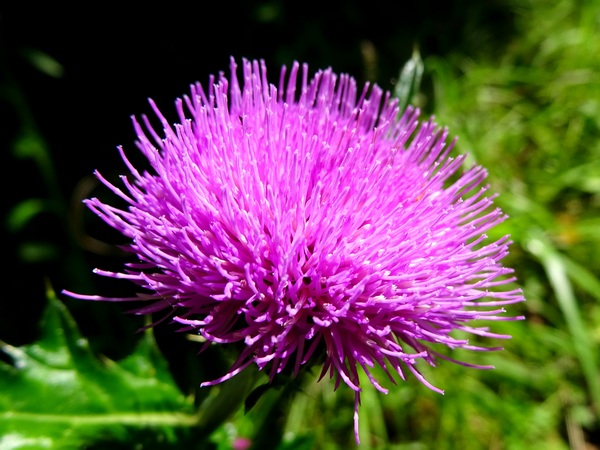
I was looking through The All-inclusive History of the Weed (Volume I, I think it was) when I came across this amazing tale. A particular town was situated along a river. The riverbank, the people soon realized, was a superior patch of ground for growing cherry trees. They planted a hundred. And the trees grew. Grew for a hundred years. Soon a zillion zillion soft pink blossoms were greeting the townspeople every spring. The joy the townspeople received from those blossoms would keep them happy for the entire year. Low blood pressure and clear arteries abounded. But then the mayor died. He was actually called the “zoombaboomer,” but that word translates, more or less, as “mayor”—though, it’s an inherited, not elected, position. Unfortunately, all the deceased zoombaboomer’s relatives who had lived nearby had also left this world for another, and the search for someone who shared even a drop of blood with the deceased mayor led to a faraway land. Fortunately, the fellow they were looking for was found at last—and he, for his part, was tickled to become their zoombaboomer. But no sooner was his swearing in (or coronation—I’m not sure which, the book isn’t clear on this point)—no sooner had he become the zoombaboomer than he looked out at the riverbank, and said, “Those weeds by the riverbank have to go.” He had the cherry trees—all hundred of them—chopped down that very day. Pink, the book said, really got on his nerves.
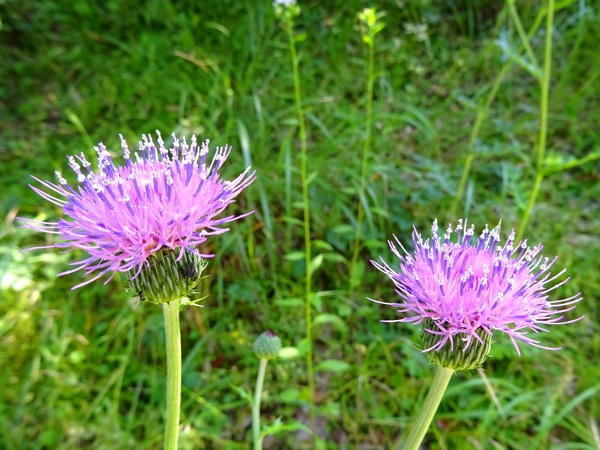
And there you are. It seems that a name—rose, Capulet, Montague . . . weed—can make a big difference . . . though, sure, the way the dandelions smile when they all get together in the sunshine changes not when they’re labeled weeds.
By the way, that silly singing twosome (sometimes known as Shizuoka Duo) claims to have “heard” the voice of a dandelion:
And let me tell you what makes me so mad
It’s the basic fact that we ain’t so bad.
We dandelions are an ethical breed
There’s really no need to call us a weed.
Potassium, calcium, Vitamin A, B, and C,
That’s the kind of stuff that fills up me.
I make the soil around me soft and clean
So nobody needs to treat me so mean.
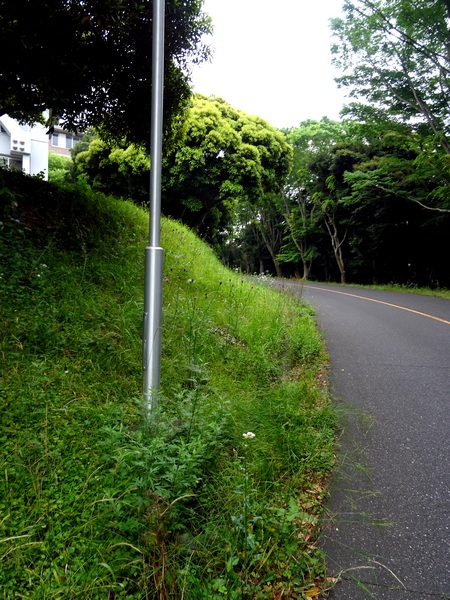
The last leg of my commute to school takes me up the winding road to the top of campus mountain. There’s a stretch that fascinates me. There are so many wildflowers. I find beauty in them, but from the university’s perspective, they’re not wildflowers—they’re weeds.
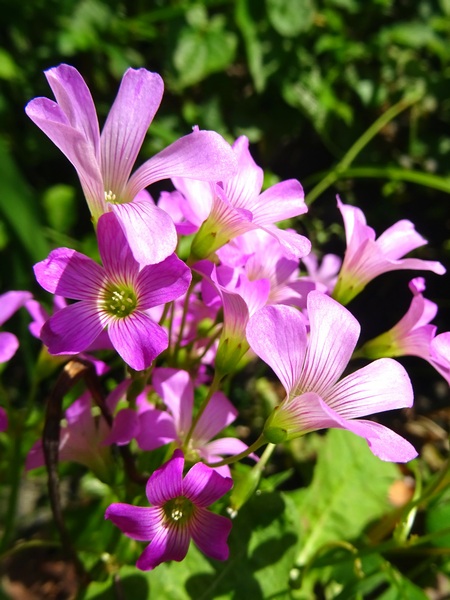
Maybe, someone worries, they attract mosquitos. Maybe, someone thinks, they encourage the mamushi (poisonous snakes) to stretch their habitat and thrive. Or maybe, someone thinks, the lanky stems of the “wildflowers” that steve likes so much are just too darned scraggly—they’re not fit and proper for a fine and outstanding university such as ours.
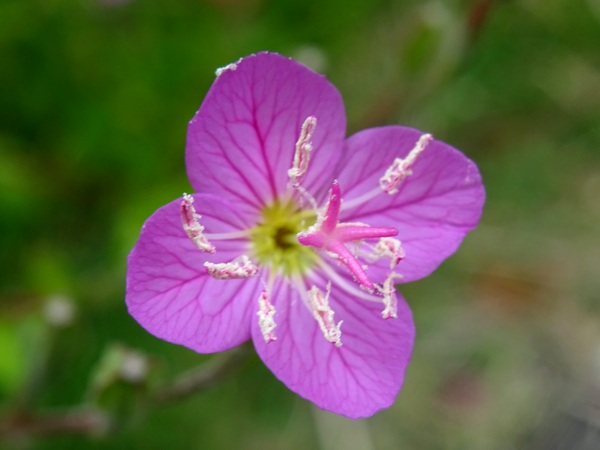
So if the university wants to call them weeds—and to weedwack them—there’s not much I can say. There’s no logical opposition to take, for weediness is in the eye of the beholder.
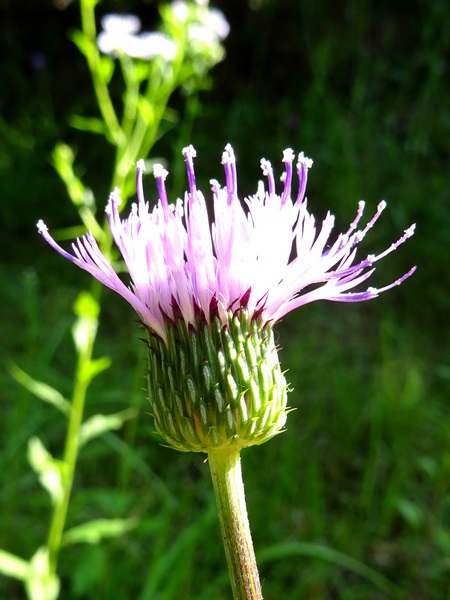
But that leaves us with another problem. What are we to think of a beautiful weed? Because no one’s going to tell me that the thistle’s crown of florets is not beautiful.
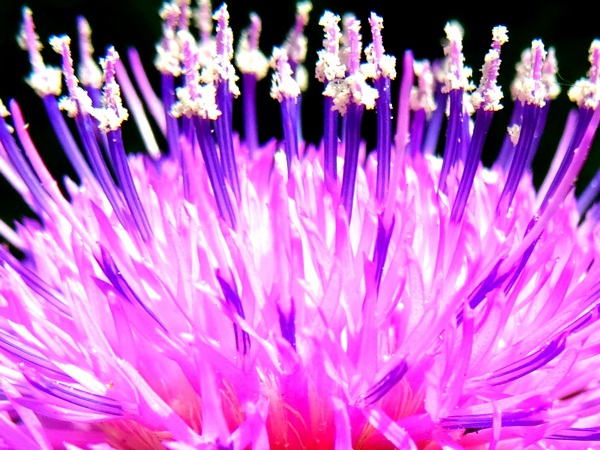
No one’s going to tell me that the dandelions and the harujion and all the other wildflowers on that stretch of road are not beautiful.
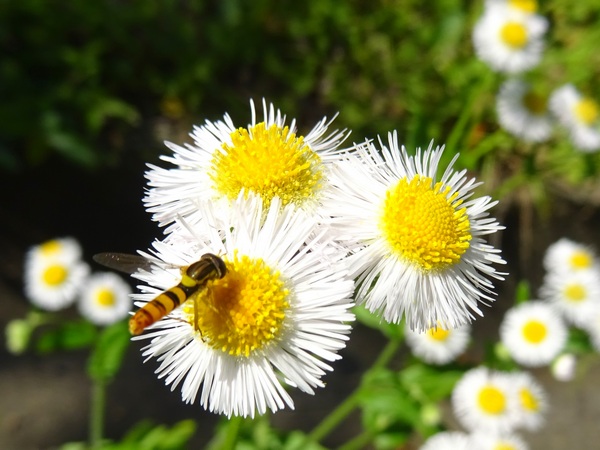
And I’m not the only one who thinks so.
So while one can imagine someone defining something as a weed and getting rid of it—the question still remains: is it all right to destroy beauty?
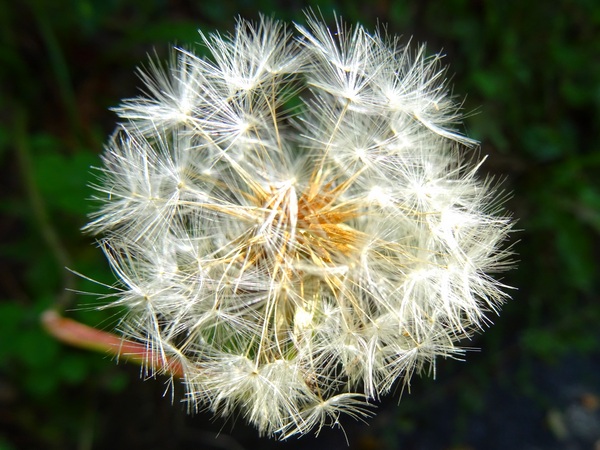
And the problem will soon get bigger—because the closer we scrutinize our stretch of “weeds,” the more beauty we’re likely to find—and the more likely we are to realize that just maybe there’s a lot more beauty out there in patches of weeds all over the place than we ever thought. We could be left with a lot of re-calculating on our hands.
Oh, dear.
At the moment, I’ve got To Kill a Mockingbird on my brain, and I keep thinking about the scene in which Atticus shoots and kills the mad dog. His children had thought he was an old guy who couldn’t do anything, so oh how his marksmanship surprises them. They can’t help wondering why someone with such a talent wouldn’t be out hunting all the time. Their neighbor, Miss Maudie, suggests a reason: “I think maybe he put his gun down when he realized that God had given him an unfair advantage over most living things.”
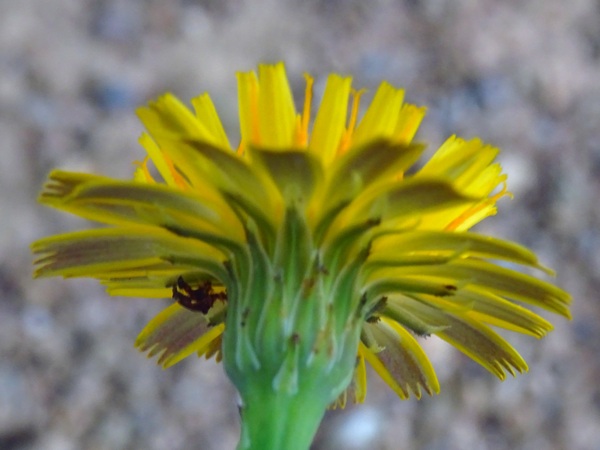
This is a useful idea, I think, when we think about weeds. With our chemicals and machinery, we do have an unfair advantage. Even a person without a gun in his holster has an unfair advantage. Say I’m staring down the cockiest of dandelions. No matter how much he may find me dispicable, there is not much he can do to destroy me. I, on the other hand, if my back can bend, can decapitate him with the smallest of exertions.
At times, we may adhere that label—WEED—and pull the trigger, and commit no terrible moral offense. And yet, there may be times, when we look close at a clump of “weeds”—really look—and see beauty (and really, more than beauty: vigour, hope, endurance, belief, ingenuity, ecological cooperation—but maybe those things are beauty), that we may want to reconsider just how exactly much we are being inconvenienced, may want to reconsider whether or not it might be wiser, from time to time, to “put down our guns.”
By the way, people are sometimes labeled weeds, too. You can, if you like, ask Shizuoka Duo all about that.
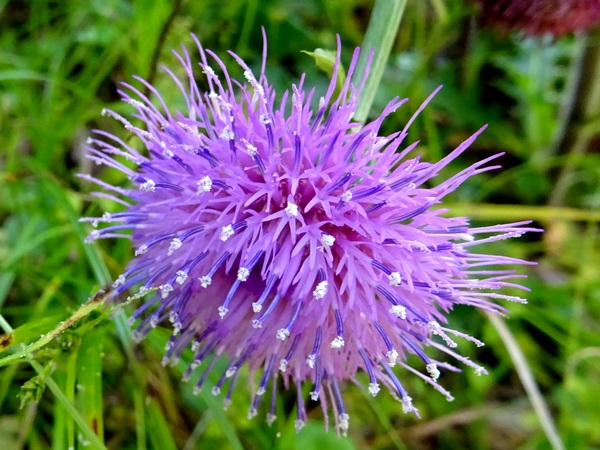
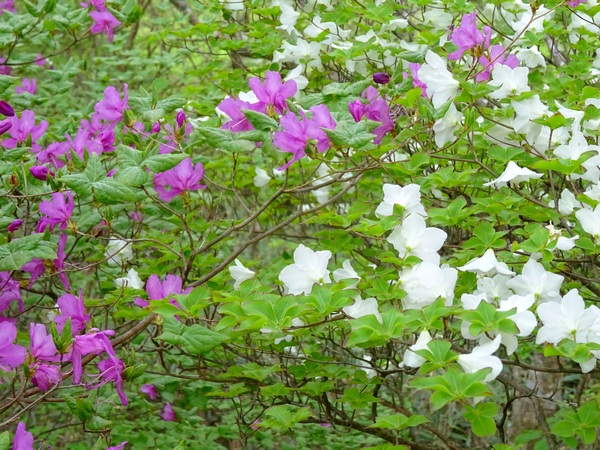
The miyami azaelas and the shiro (white) yashio were blooming gloriously as we walked along the first leg of the trail up Hakkorei and then over to the Abe Pass .
We knew they would be, we’d been up just the week before, and in the car, as we got closer to Umegashima early that morning and saw the skies still blue . . .
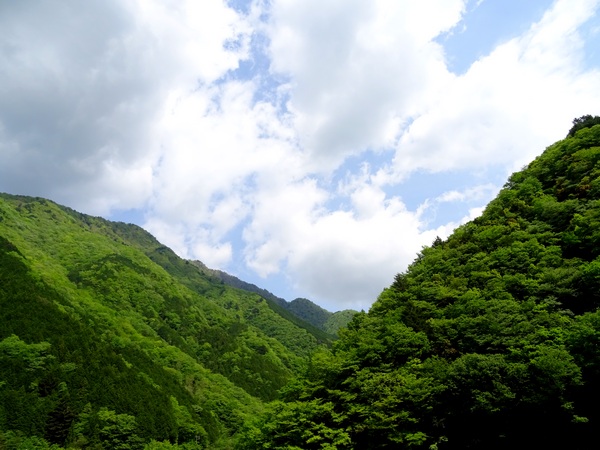
. . . we had hopes that it might be a perfect day for taking photographs (that is, green and red and white and purple on a background of bright blue photographs).
Alas, the skies went grey.
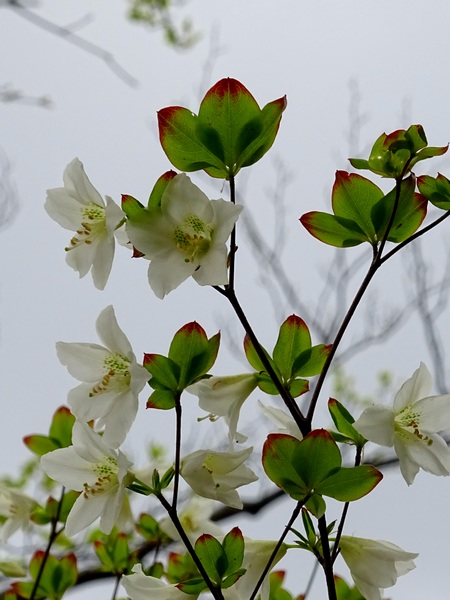
I’d really hoped for those blue shots (thought I might even make a new and cheery bookmark) . . .
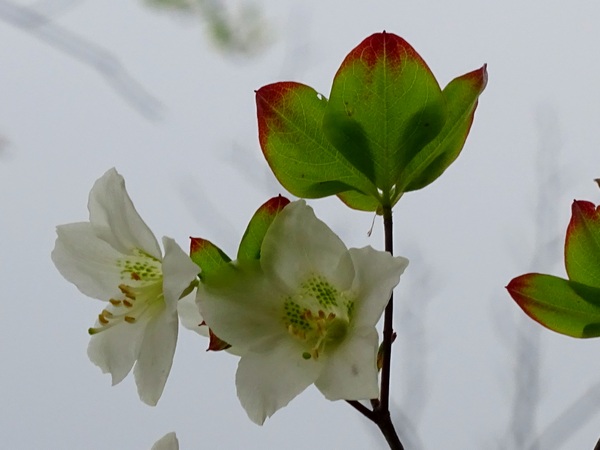
. . . but the grey fascinated, too.
When the yashio are in full bloom under a brilliant blue sky, they seem so jolly and joyful. They seem to have such light hearts—and to blossom and shine with such magnificent ease.
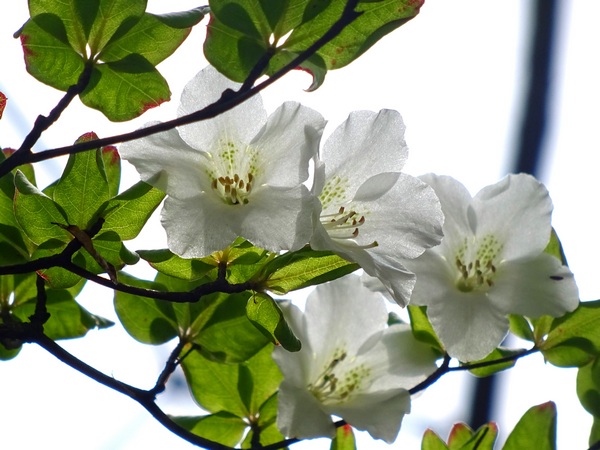
In the grey, you feel their earnestness.
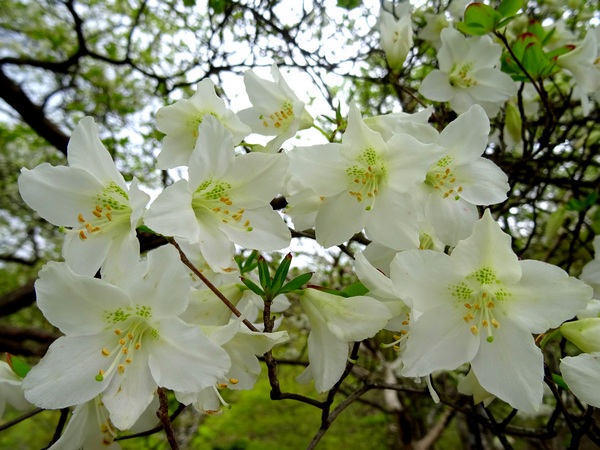
In the grey, you feel the pride they feel in the way they go about their lives.
It made me feel a bit of pride being there walking amongst them.
And it made me feel how natural it would be, in the woods, to have an “extreme” thought.
Oh, dear.
I wish to speak a word for Nature, for absolute freedom and wildness, as contrasted with a freedom and culture merely civil—to regard man as an inhabitant, or a part and parcel of Nature, rather than a member of society. I wish to make an extreme statement, if so I may make an emphatic one, for there are enough champions of civilization. (Henry D.Thoreau)
The green-purple-white was nice, too.
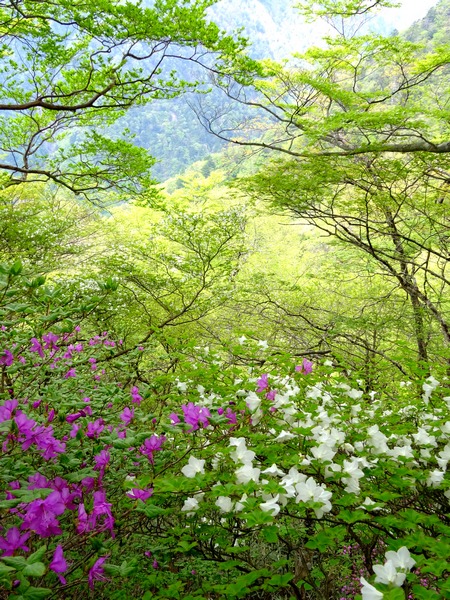
But when the blooming trees are scattered along the ridge and the focal points are numerous, the naked eye does a better job of discovering the beauty than the camera. At least a better job than my camera when operated by me.
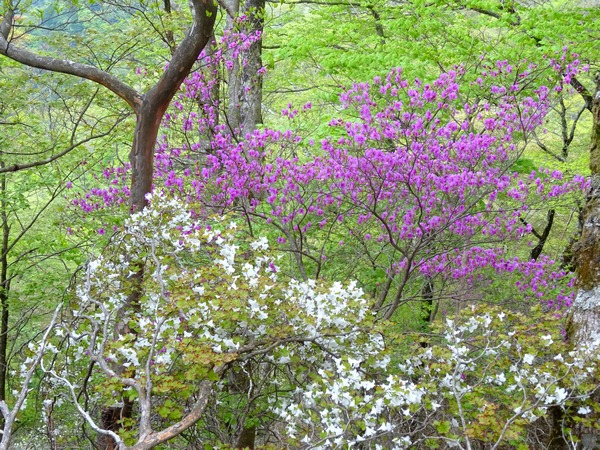
Here and there, orange azaelas were blooming, too.
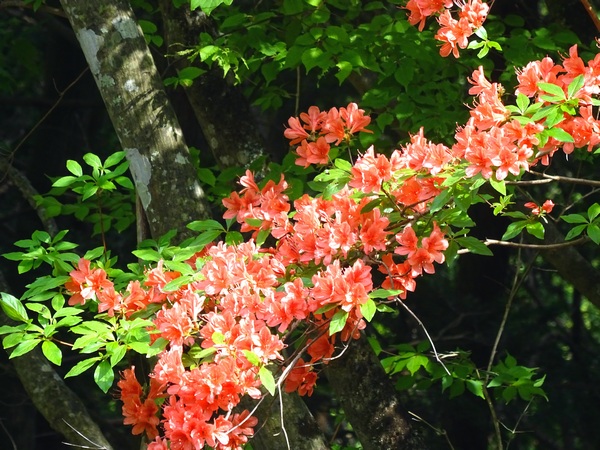 So what to say?
So what to say?
If you have the time / To come along with me
The will to climb / To where you can see
If you have the mind / To set yourself free
You might feel sublime / Know your reality . . .
. . . all around you. / It’s all around you.
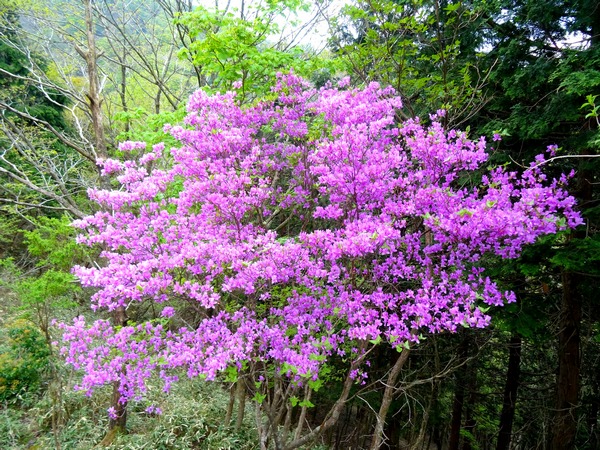
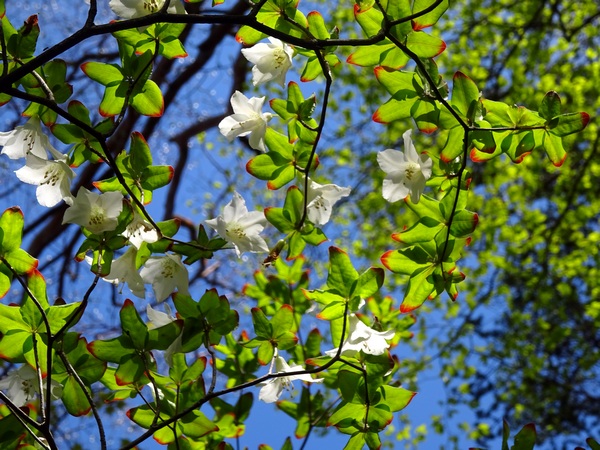
May 8th. We Hearty Hikers suspected that it might still be a little early for the shiroyashio (the WHITE yashio) to be blooming, but thinking it was better to be early than late, we drove up to Umegashima and climbed the first half of the trail up Mt. Hakkorei.
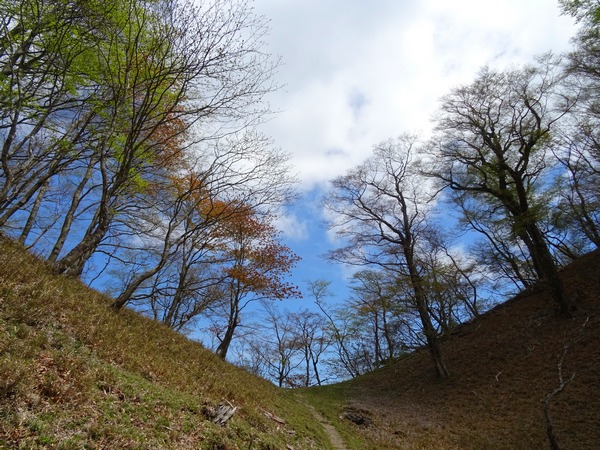
We went up as high as the Fujimidai lookout, then crossed the ridge to Abe Toge (the Abe Pass), then walked back down along the Sakasa River to where we started. The ridge in the above photo separates Shizuoka and Yamanashi prefectures.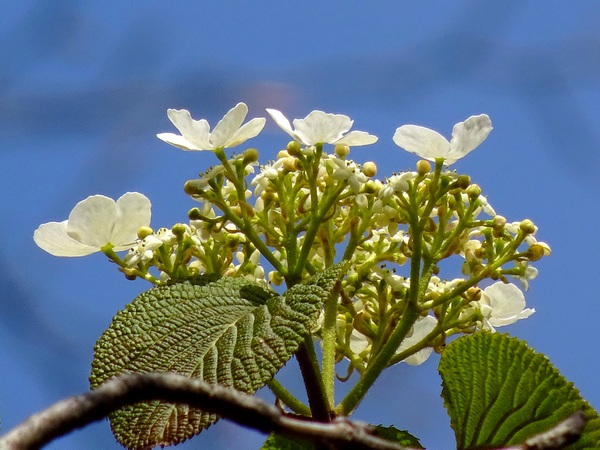 The demari were beginning to bloom, as were the purple miyama azaelas, but it was the yashio, as every year, that so captured our hearts.
The demari were beginning to bloom, as were the purple miyama azaelas, but it was the yashio, as every year, that so captured our hearts.
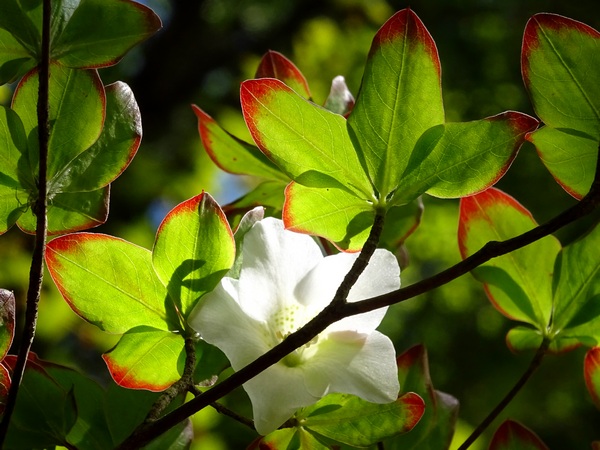
Yes, we are crazy about them.
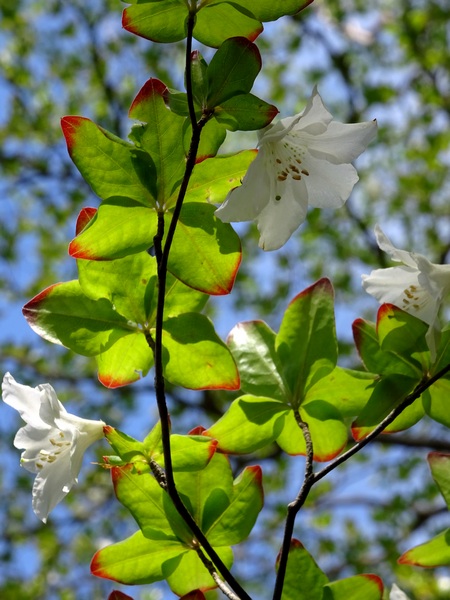 The red-tipped green stars and white blossoms—under the blue sky—give us great joy.
The red-tipped green stars and white blossoms—under the blue sky—give us great joy.
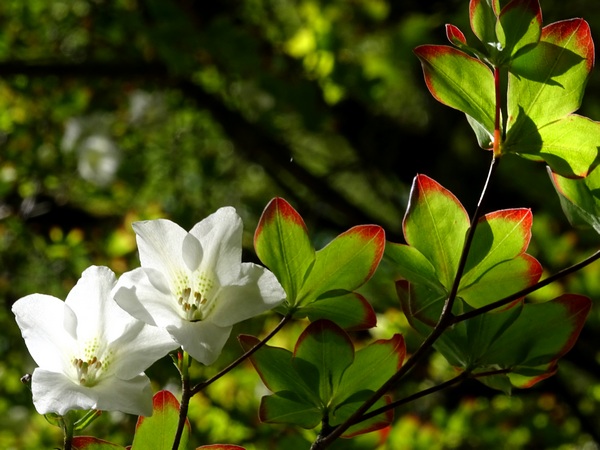 We could take a zillion pictures—and still want to take more.
We could take a zillion pictures—and still want to take more.
Our old buddy Fuji-kun floated by, too, to have a look at the yashio. 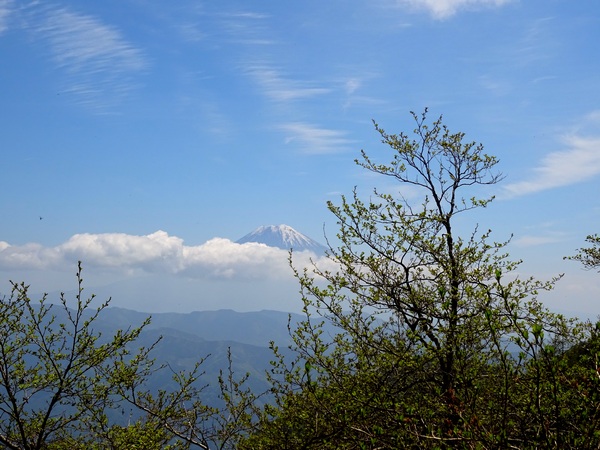 This Japanese tit flew in, too, to have a look.
This Japanese tit flew in, too, to have a look.
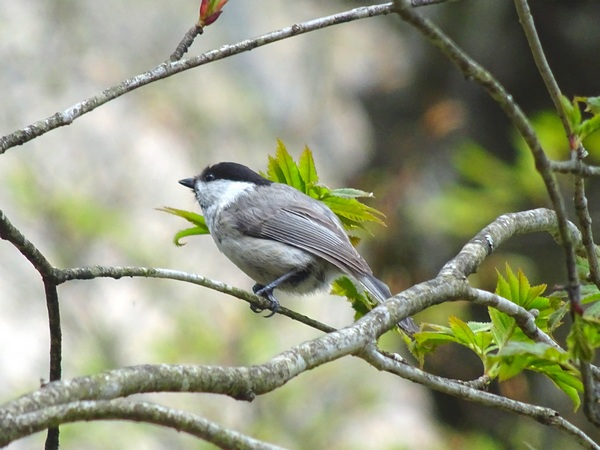
Okay, okay—so that’s a bit of an exaggeration. The tit was obsessed with a certain tree, just as we were, but it was a different tree.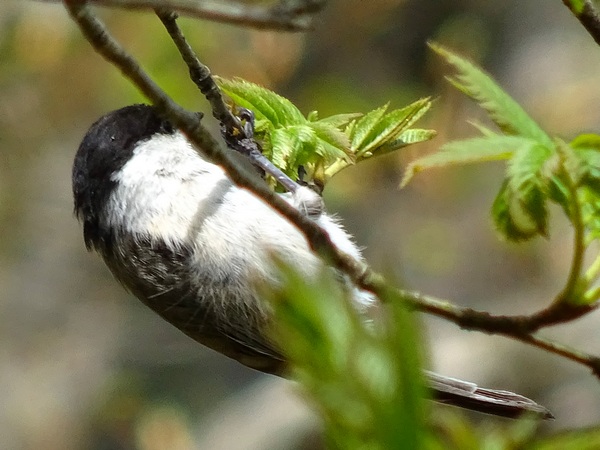
So obsessed, in fact, that he cared not at all how close we got to him.
Wonder what it tasted like?
The woodpecker was a different story. We heard him and his buddies all over the ridge—but he only flew into sight for a handful of seconds.
Kindly, though, the yashio remained still enough for us to take as many pictures as we wanted. 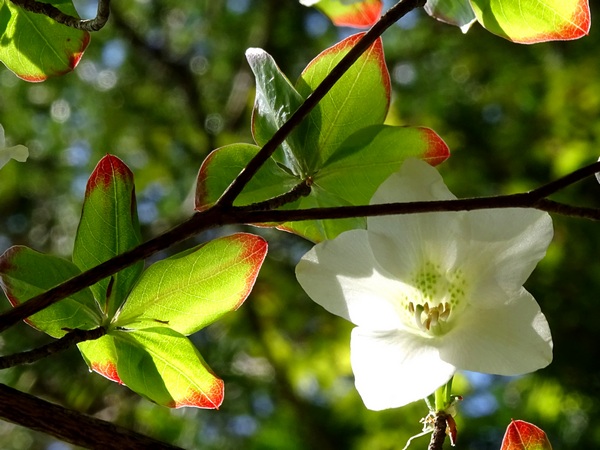
So we did. We were very grateful.
The trees were blooming on the first half of the climb up to Fujimidai . . . 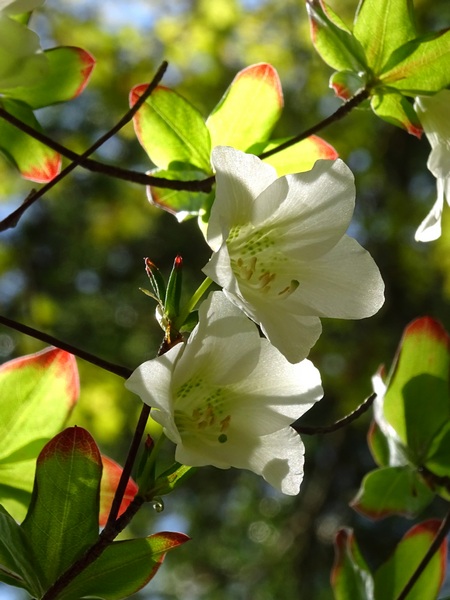
. . . and were mighty perky . . .
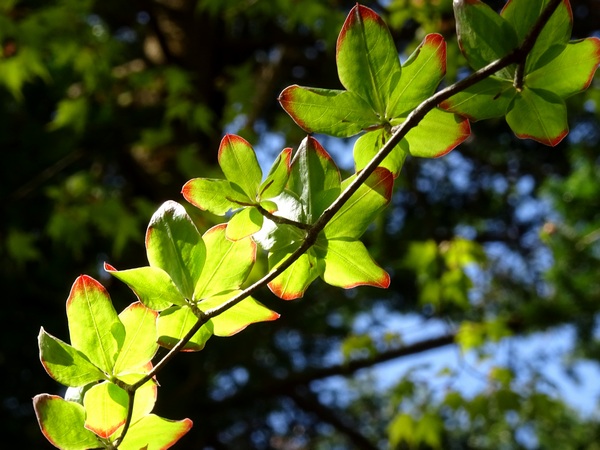
. . . I mean mighty mighty perky . . . 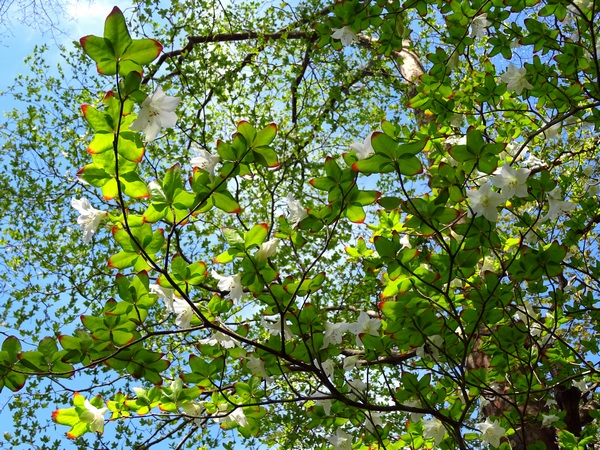 . . . but I’d say only about a fifth of the blossoms on the whole mountain were out.
. . . but I’d say only about a fifth of the blossoms on the whole mountain were out.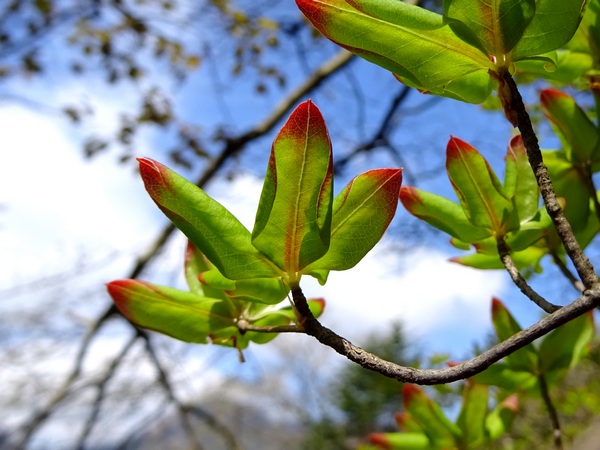
The higher we went, the more we saw leaves still busting open. The more we saw the flower buds still tightly closed.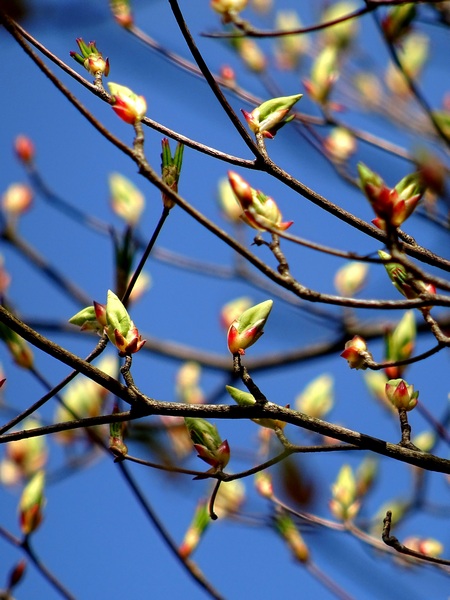
Which of course means that next weekend, a climb up Hakkorei will be a glorious experience indeed. Maybe I’ll see you up there.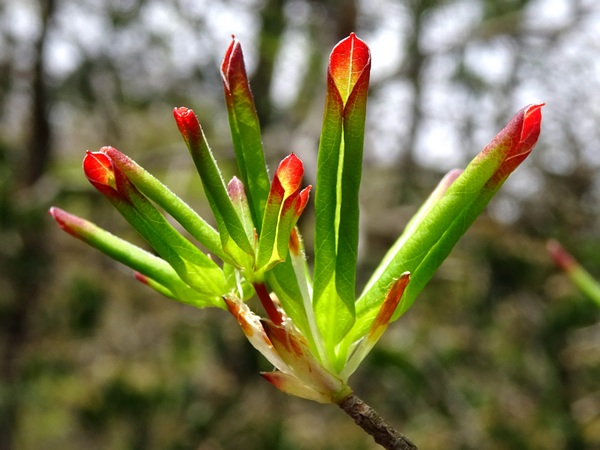
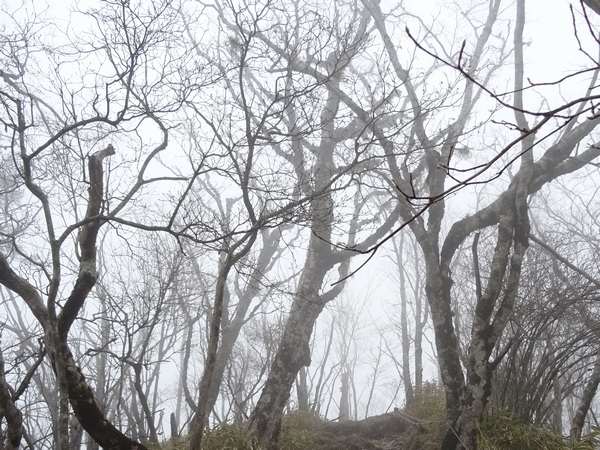
Honesty compels me to tell you that a big reason for deciding to climb Mt. Hakkorei on April 23 (no, no, not to celebrate Shakespeare’s birthday) . . . was to check out how far along the shiroyashio leaves were coming—and to get a vague idea of how many weeks away the blossoms were.
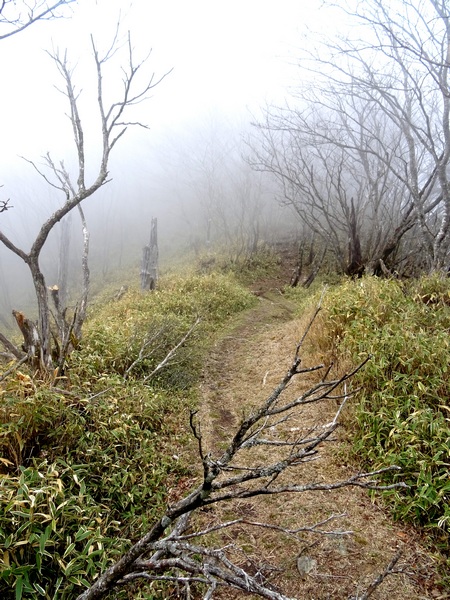
There is nothing more beautiful than the yashio’s star-shaped leaves, green with red tips, nestling in those white blossoms, under a clear, deep blue sky.
On the 23rd, there were only a faint hint of the leaves opening up, and no sign of the flowers blossoming.
And then there was all that mist.
I love the mist—always have.
But I thought those two guys from Shizuoka Duo (yes, yes, they were there, too) might be disappointed. After all, the panoramic views disappear when the skies are grey.
But how wrong I was!
I don’t think I’d ever seen anyone so happy to be trapped inside the mist as we were—to have the range of our vision cut down so drastically.
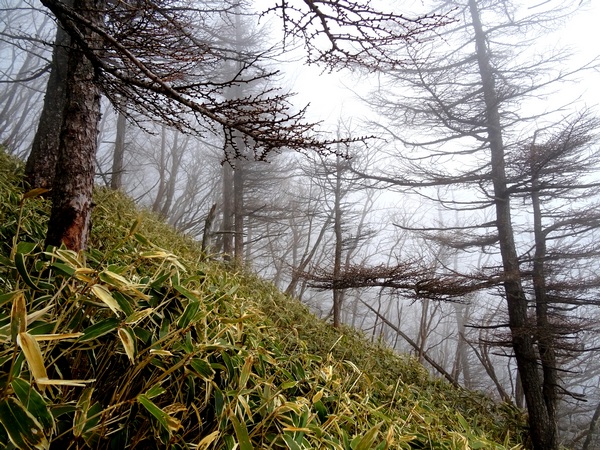
It’s amazing how on a sunny day, you walk right past some of the most gorgeous stuff. But when you can’t look far and wide into an endless blue sky, well, you tend to look at things close up, or things at your feet.
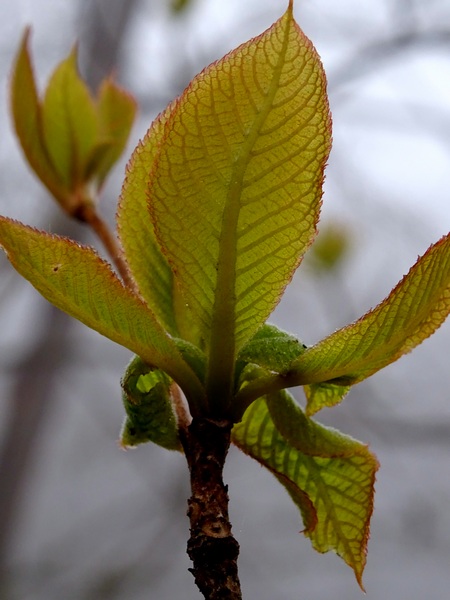
I’d lagged behind a bit and then caught up, and when I did, I was so surprised to see those two Shizuoka Duo guys down on the ground, on their knees, their cameras in a patch of flowers—a species of flower I’d never noticed before.
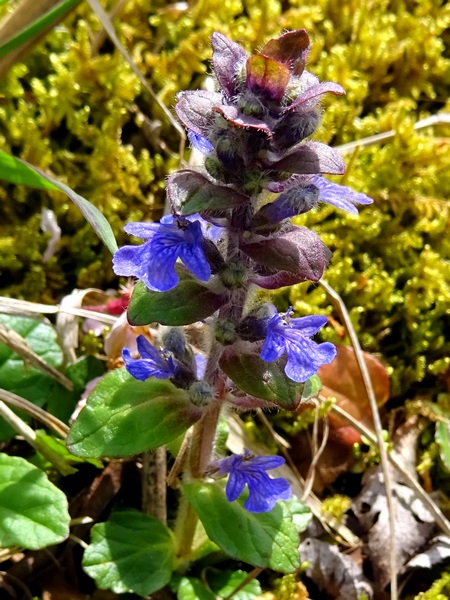
And then for the rest of the hike, they were singing away, trying to figure out the lyrics and a melody for a new song—and dropping to their knees each time they came to a new discovery.
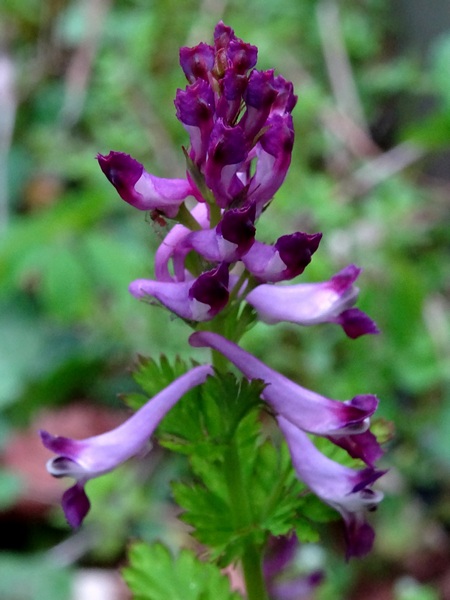
If they could stay in key—and that’s definitely a big if—I think I might actually like some of their stuff. What they were singing on this day, I tried to imagine in my own head, in key, and yeah, I thought I kind of liked it.
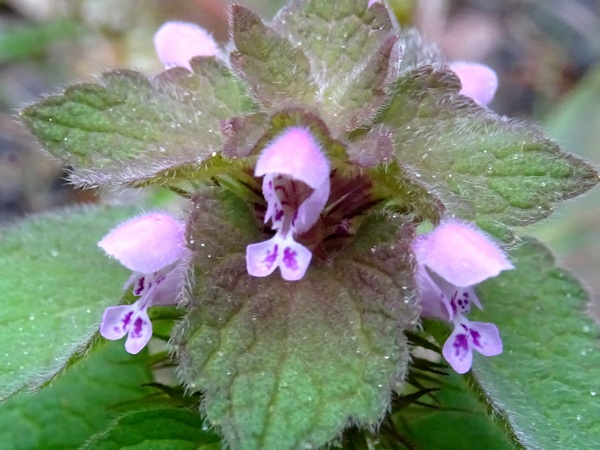
Hangnail’s getting really bad.
Leaky faucets make you mad.
Car keys have got you in a search.
Boyfriend has left you in a lurch.
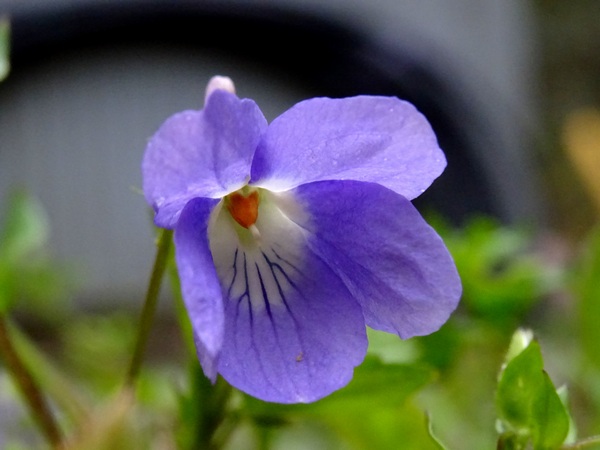
When the sky is cold and grey,
Scenic views all wash away.
Your shoulders slump, you hang your head.
You feel as if you’re standing dead.
Your eyes are glued upon the ground.
The bird of hope won’t make any sound.
You ask me how it got this way.
Here is all I have to say.
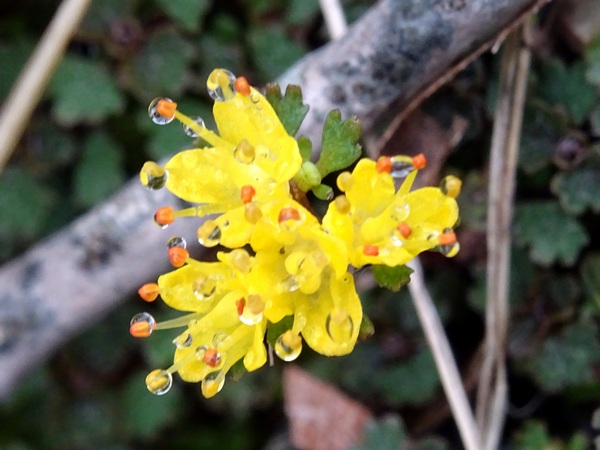
When your eyes are on the ground,
There really is so much to be found.
Walk the misty woods and see.
At tiny flowers fall to your knees.
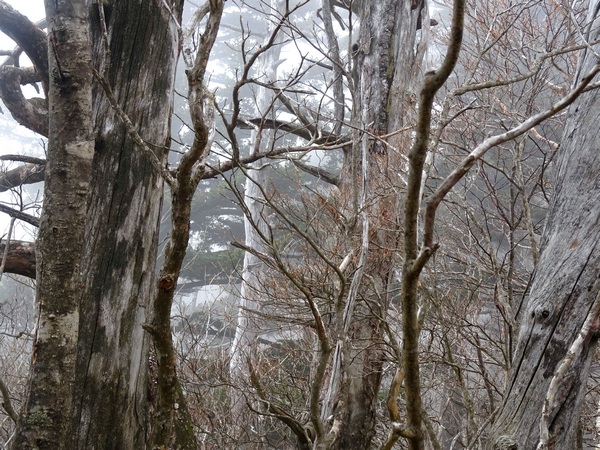
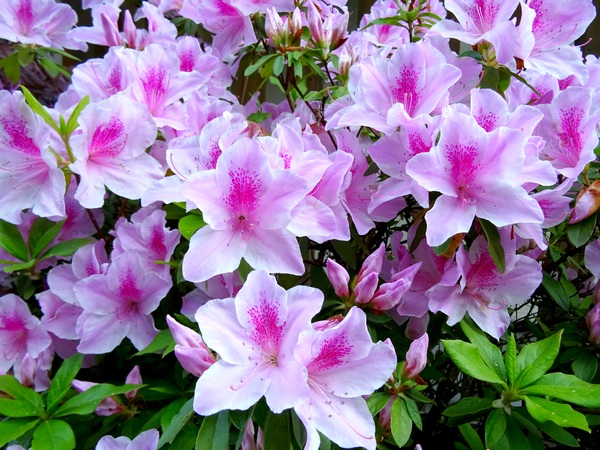
Whether you’re having a good day, or a not-so-good day, the azaelas remain ablaze. It’s what they’re good at, and it may sound like a strange thing to say, but no matter what you’re feeling right now, I’m pretty sure the azaelas know what it is.
A few weeks ago, when they had just begun to bloom, I took a photograph and thought of uploading it to Facebook. It’s not a photograph in this post.
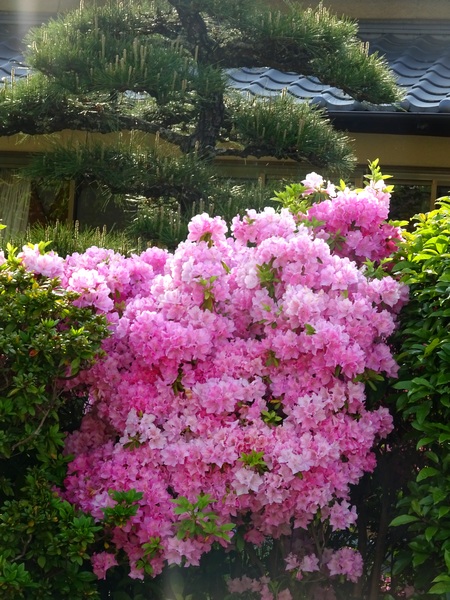
This time of year, lots of folks are uploading pictures of azaelas, both in Japan, my current home, and America, the place I was born. Of course they do. The azaelas are magnificent. Their colors are so alive.
No joking, on a day like today, I feel as if I can hear them standing tall, fazed by nothing, proclaiming in song their glory.
But before I could post my photograph to Facebook, a Facebook friend posted his. When I saw his photograph, I felt something very deeply. There were so many pictures of azaelas uploaded on Facebook, but this one I felt could have been one I had taken myself.
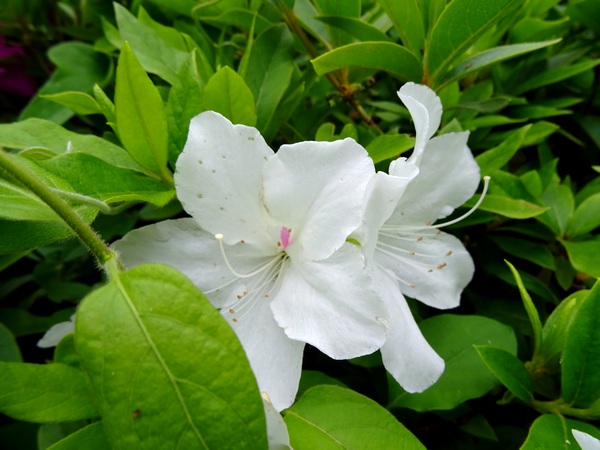
Actually, I felt as if I’d taken his picture—and he’d taken mine.
Of all the photos uploaded, his was the only one that made me feel that way.
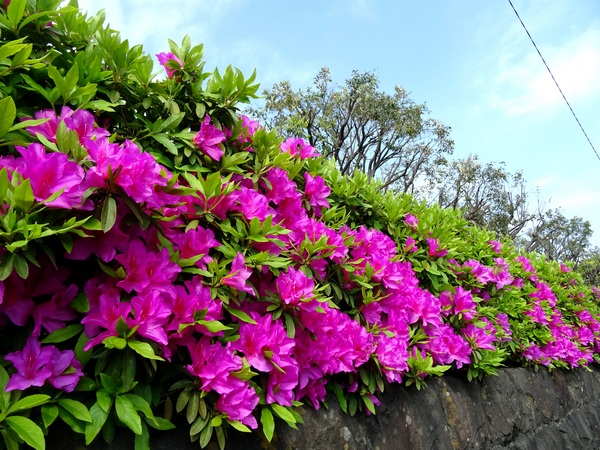
So I didn’t post mine. I felt mine was already up.
He had sent me a friend request only a few months ago. He was someone who had lived up the street from me when I was in high school, someone whose name I knew, but not someone I had ever spoken to much, if at all. He was a couple of years younger than me.
But I usually liked his posts.
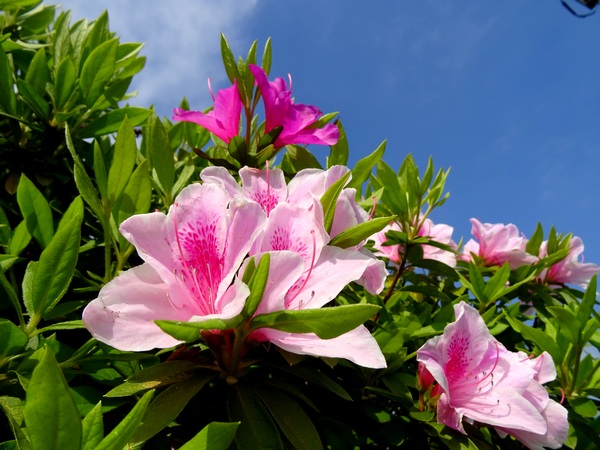
Not always, but sometimes, when I looked at his images (ones that he was sharing with everyone, of course), I felt as if we were standing in front of them together, looking at them together, seeing them the same way. I don’t know, maybe other people who saw them felt that way, too.
Sometimes he “liked” my posts.
Everyone likes to get “likes,” but I was especially happy when I saw his name below one of my posts.
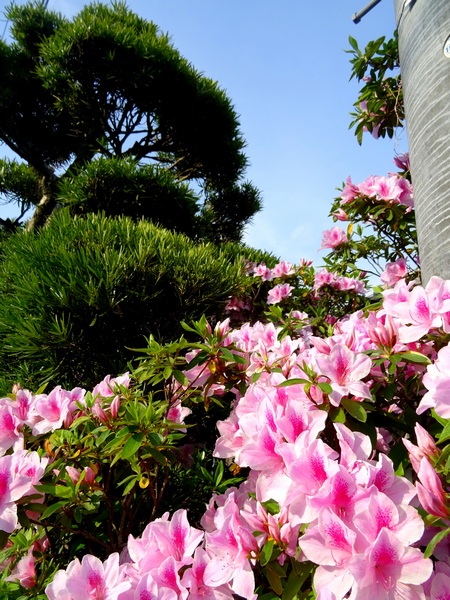
I knew nothing of his personal life, nothing of his views on political issues, but somehow, for a little while, I felt close to him. I realized this before he passed away, but sadly I have realized it more keenly since.
I won’t write his name here, I don’t know if his family and close friends would want his name on my personal and public blog, but I would like to express my heart-felt condolences to them anyway.
From far, far away, it struck me that he had a knack for seeing things—and for sharing with others what he had seen. I was grateful for that.
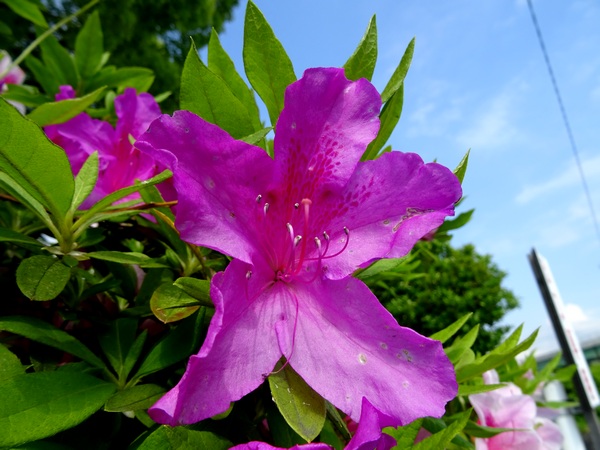
Perhaps a silly poem, I don’t know, but I offer it sincerely.
My good friend . . . he passed away.
All the while . . . the azaelas stayed ablaze.
Unlike me, they stood unfazed.
Oh, those colors . . . how they did amaze.
Then I . . . could see . . . all . . . he meant to me.
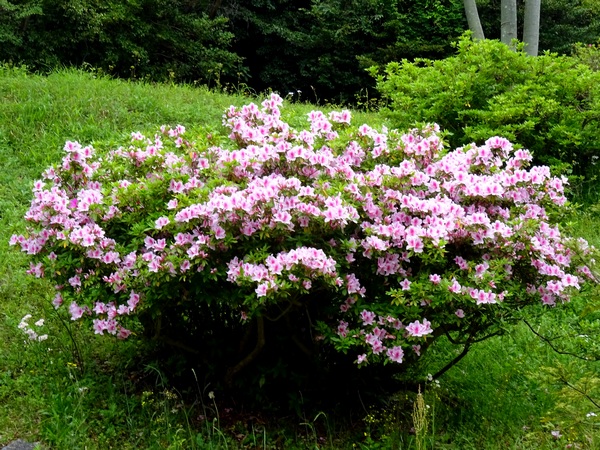
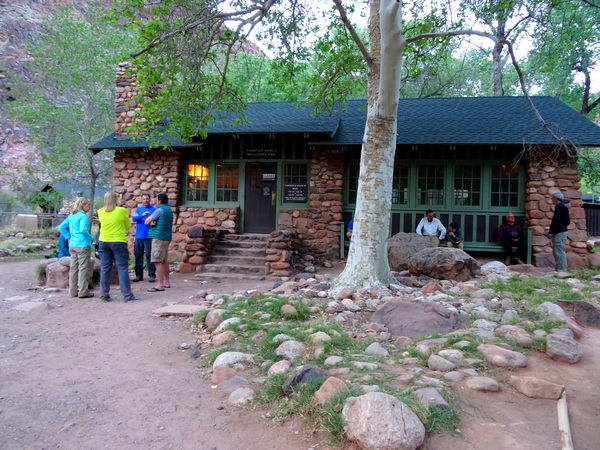
It was March 25th. We’d gone down into the canyon, and now we had to climb back out, 10.3 miles along the Bright Angel Trail . . . and about a mile up.
We had breakfast at 7 AM, at the main building of the Phantom Ranch, all the eggs and pancakes you could eat . . .
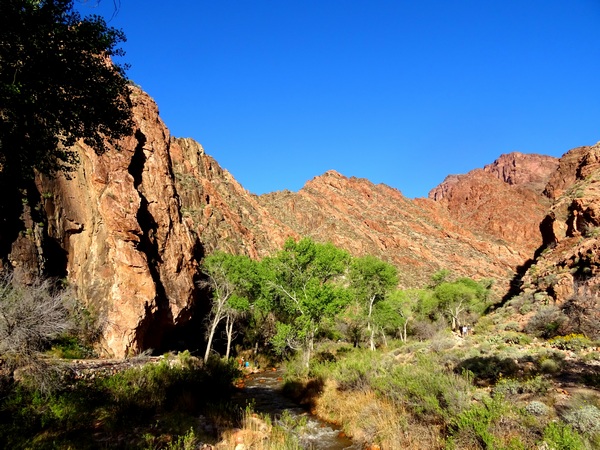
. . . and then, at 7:50, headed back down to where the Bright Angel Creek flowed into the Colorado River.
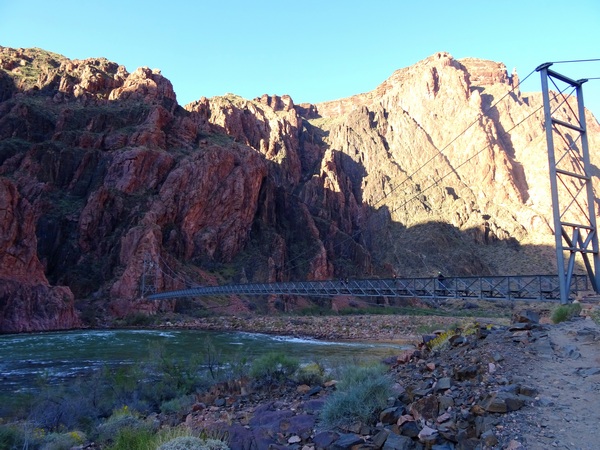
We crossed the Silver Bridge, then turned downstream . . .
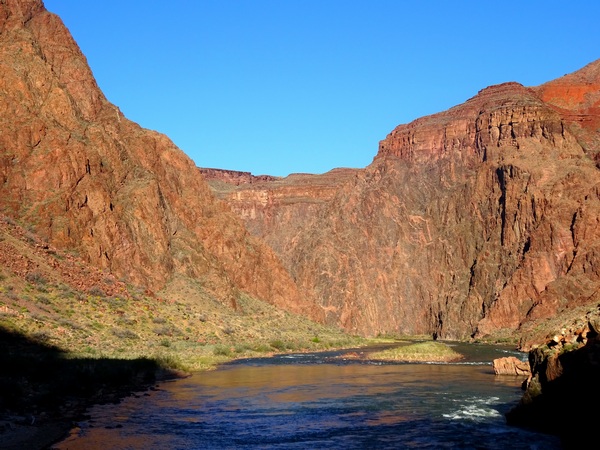
. . . and walked along the river trail for about an hour. One stretch of the trail was pure sand, several inches deep. The sand sparkled and the rocks sparkled, and there was blue sky sunshine all above, and when we looked away from the river, we seemed pretty much in the midst of a magical diamond desert.
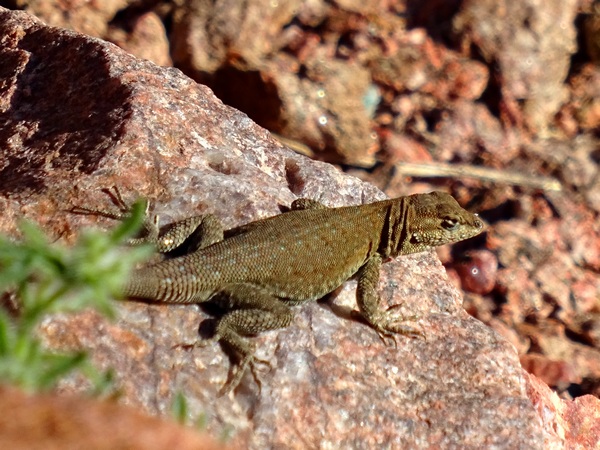
Lizards like the desert.
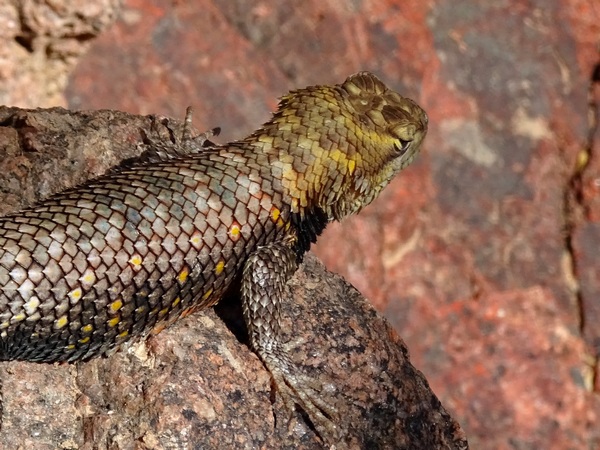
Lizards and rattlesnakes. Didn’t see a rattlesnake, but heard they were already out and about.
At 9:00, we came to the Pipe Creek (named so because someone long ago had stuck a pipe in a tree by the creek to show others coming later the way), and turned up it.
While the South Kaibab Trail keeps you out on a ridge most of the time—and in command of majestic panoramic views, the Bright Angel Trail keeps you inside the Pipe Creek canyon and more face to face with the canyon walls.
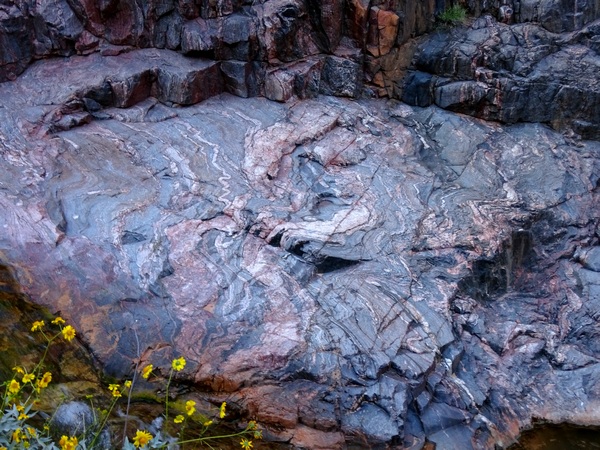
The shade you get is quite welcome, and the rocks you pass by get your “abstract art” brain in full gear.
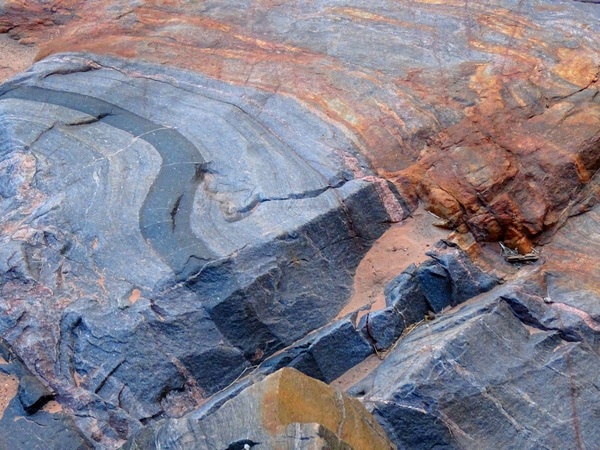
Take a step, travel a million years.
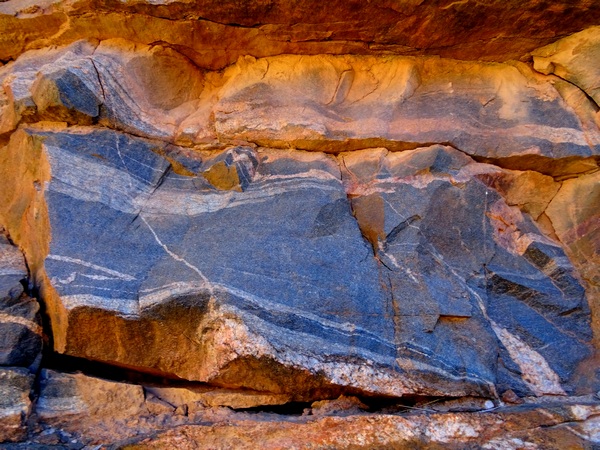
You seem to be able to see deep, deep, deep into history—for me, it was kind of like I’d finally dove deep enough to get a glimpse of that white whale—and yes, he was swimming peacefully along with his family and chums, despite those harpoons we’d stuck in him.
Right about when I was thinking of that white whale, well, I’m not sure exactly, but something happened to me. I felt as if my head was heating up (yes, maybe it was the sun), and believe it or not, no sooner did I feel a flame in my brain than I spotted this squirrel . . .
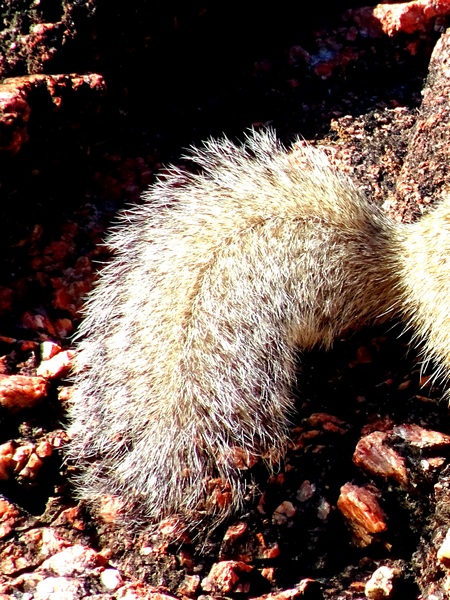 . . . and he looked into my eyes and lit up like a lamp just like that. His tail went all aglow. God’s truth.
. . . and he looked into my eyes and lit up like a lamp just like that. His tail went all aglow. God’s truth. 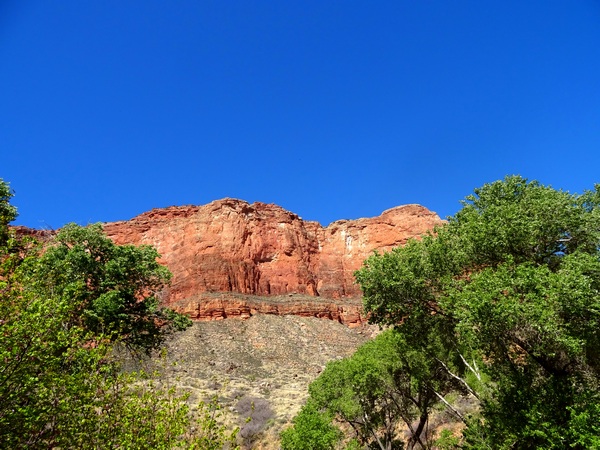
Well, maybe it was the sun. I mean, it was strong . . .
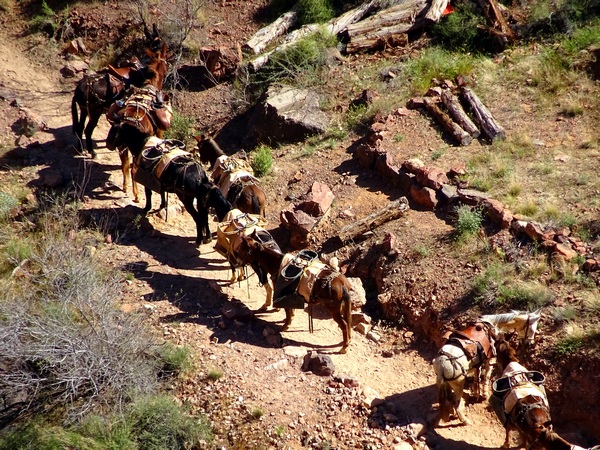
. . . and even the mules didn’t seem to want to walk out in it too long without a break, but anyway, later I couldn’t quite remember what I’d walk by when (and thus the pictures that follow are probably all out of sequence)—I could only remember there were . . .
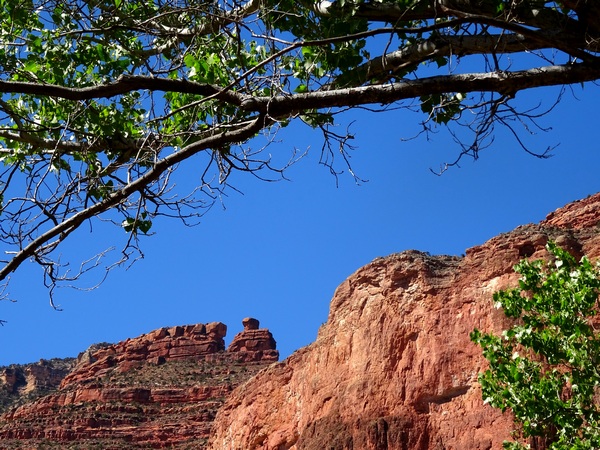
. . . amazing formations of red rock . . .
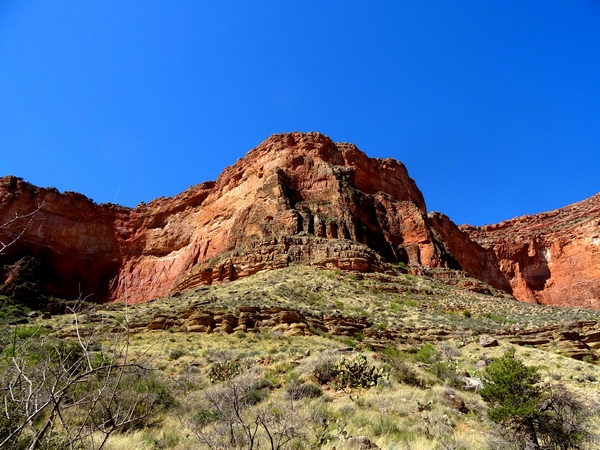
. . . so beautiful . . .
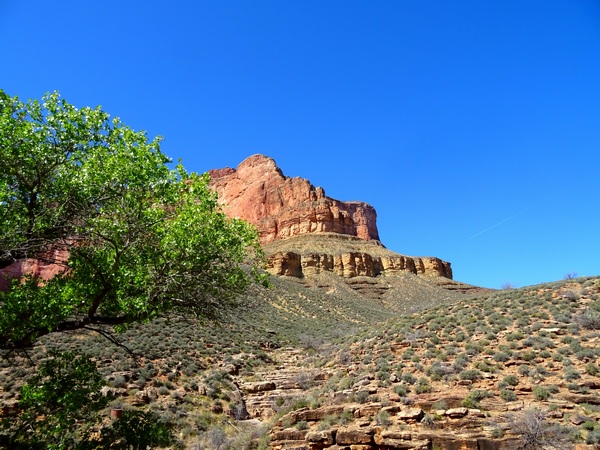
. . . and those cottonwoods wherever there was a dab of water . . .
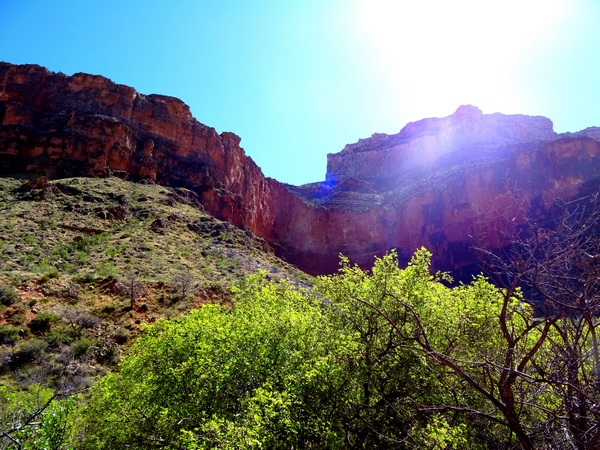 . . . and that dang-blasted blue-sky, diamond sunshine everywhere turning the rock and the dry dirt into a glittering field of sparkle.
. . . and that dang-blasted blue-sky, diamond sunshine everywhere turning the rock and the dry dirt into a glittering field of sparkle.
And then I was hearing voices . . . and I thought I heard someone say . . .
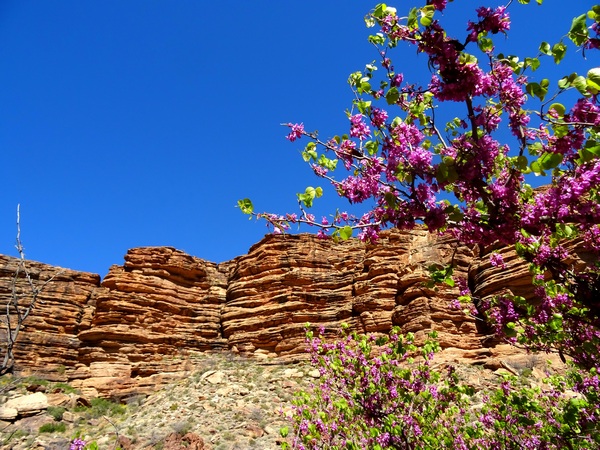 “Rosebud.”
“Rosebud.”
And that was just too damned weird.
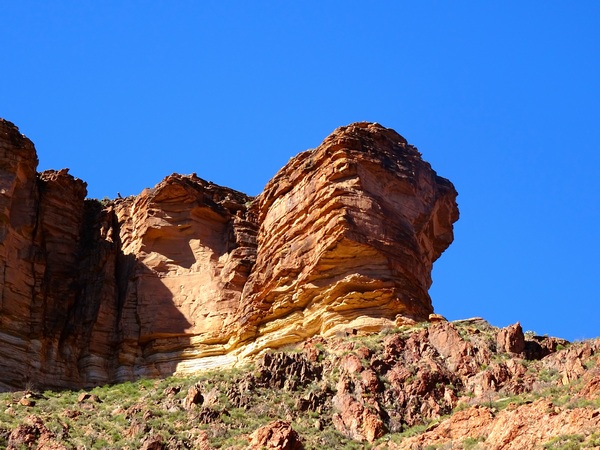
So I shook that voice right out of my ears.
But no sooner had I than another came flying in—even louder.
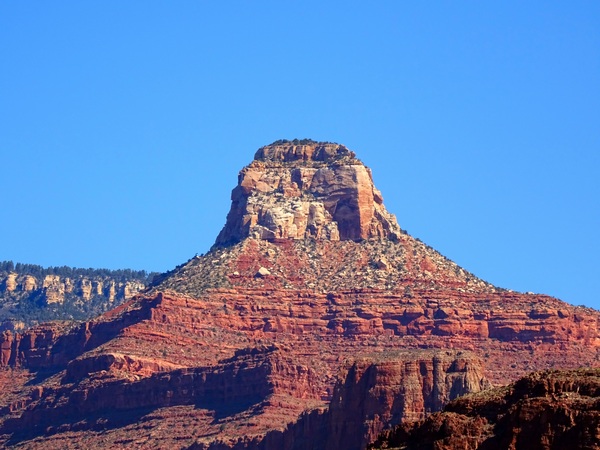
And it said, “This land is yours.”
So of course I said, “Come again?”
And it said, “And mine, too.”
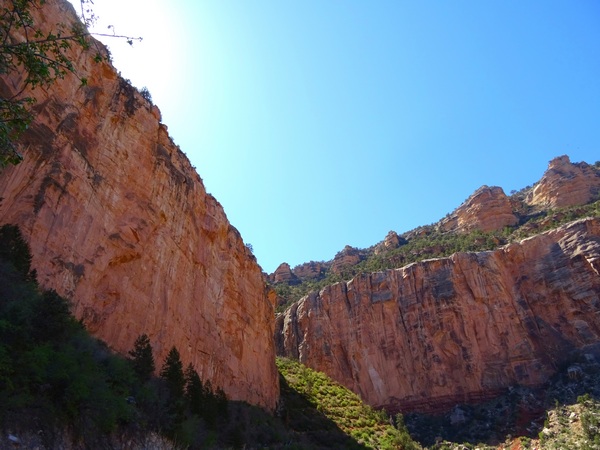
And then a different, a kind of nasal voice came in, swooping down over the red ridge in a little burst of wind, and said, “It’s ours? We are free to possess it? And just who is this we?”
And then another voice was laughing and chuckling, “You little fool, this we is all that ever breathed.”
!!! Footnote at end of post. !!!
We, the Hearty Hikers, got to the Indian Garden campground at 11:15. There were a lot more people around there than there had been lower on the trail, and we could fill up our water bottles. We had lunch.
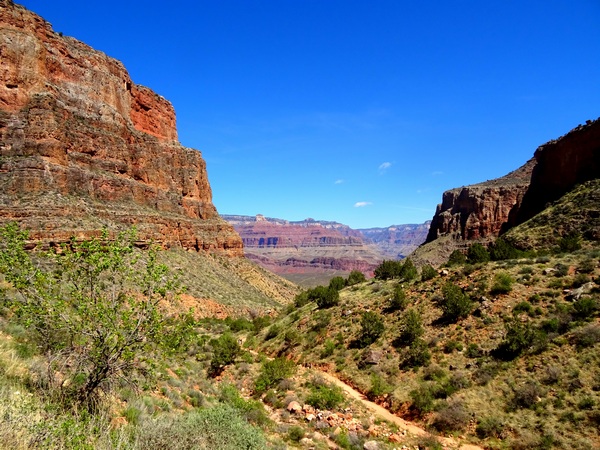
And then up, up, up we went. I didn’t hear the voices swirling around my ears anymore, but I think maybe they’d gotten into the Indian Garden water. I could feel them swimming in my belly, even though they kept fairly quiet.
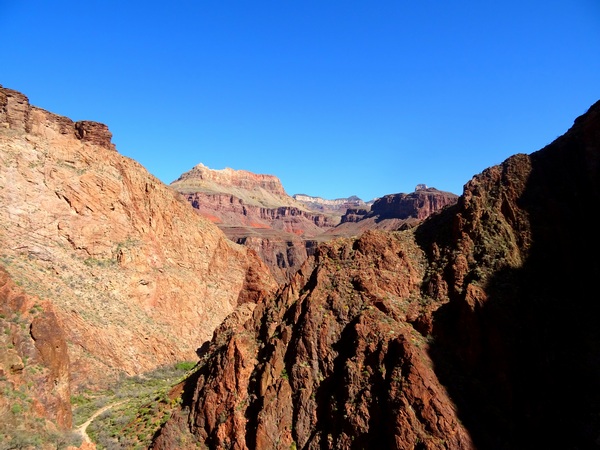
The view below got bigger . . .
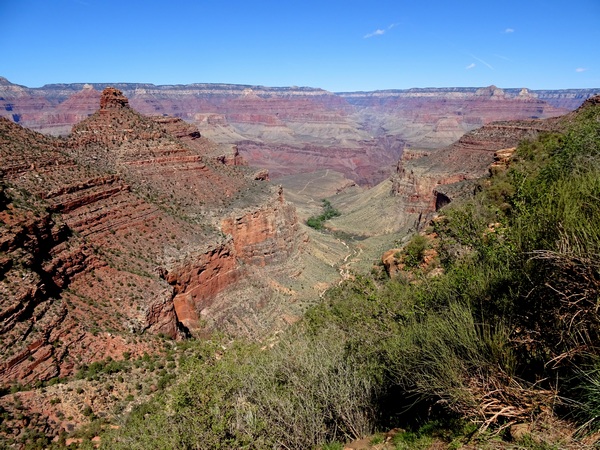
. . . and bigger.
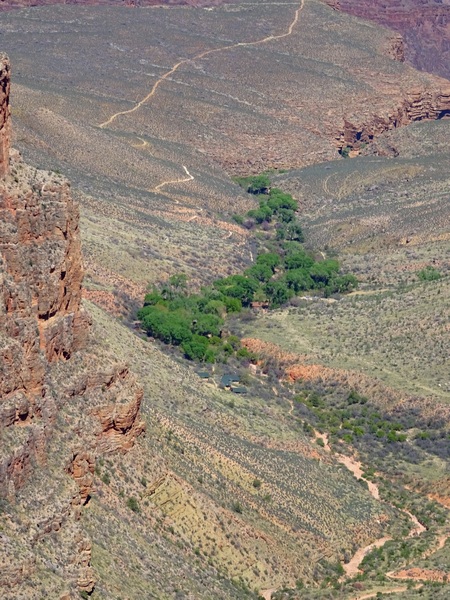
And it was nice to look down on the cottonwoods, to see what we’d come through, and to see so clearly the trail that led off to Plateau Point. We hadn’t had the time, and probably not the energy, for that stretch.
Something left for another day.
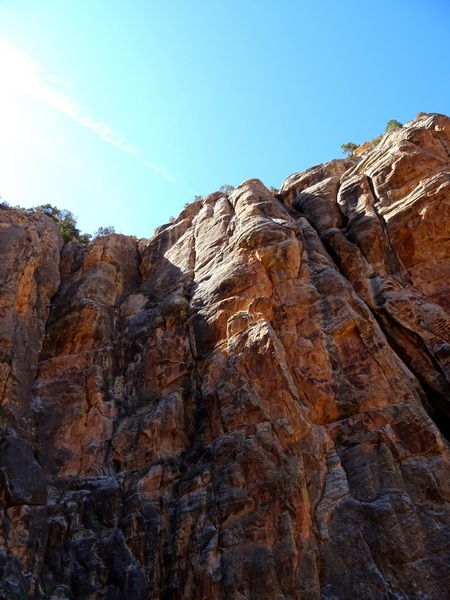
And yeah, it was still a long way up.
But up we went. Three miles to go. Then a mile-and-a-half.
And then we were sure we would get to the rim.
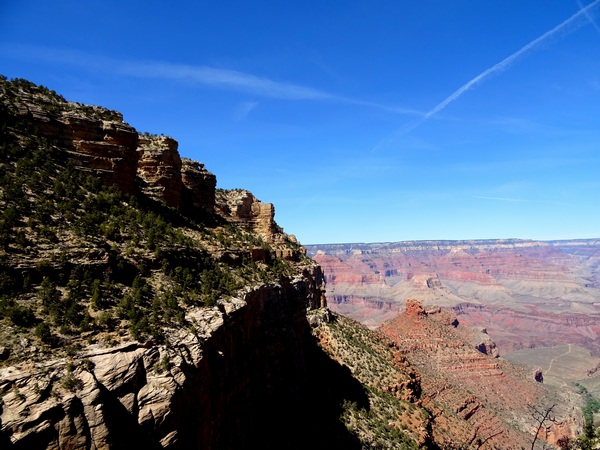
Go ahead, Hearty Hikers. Take a moment. Look out. Try to remember what it looks like from the inside.
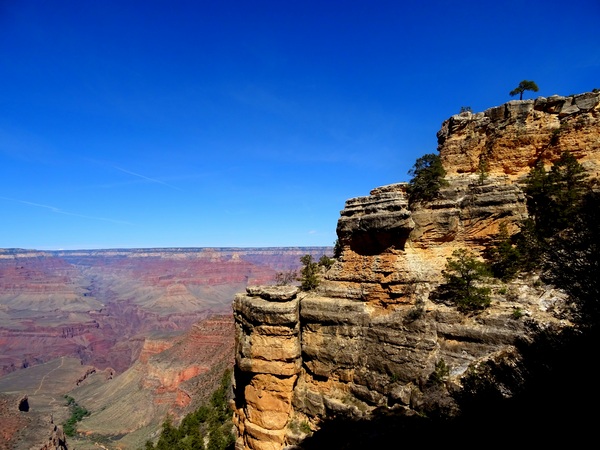
Take a loooooong look.
And then it was 2:50 in the afternoon, a mere seven hours of walking uphill, and we were out.
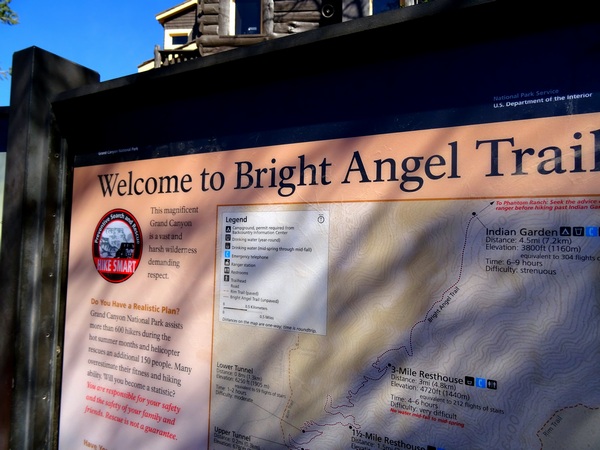
At the Grand Canyon, I assure you, it’s a good idea to read the signs.
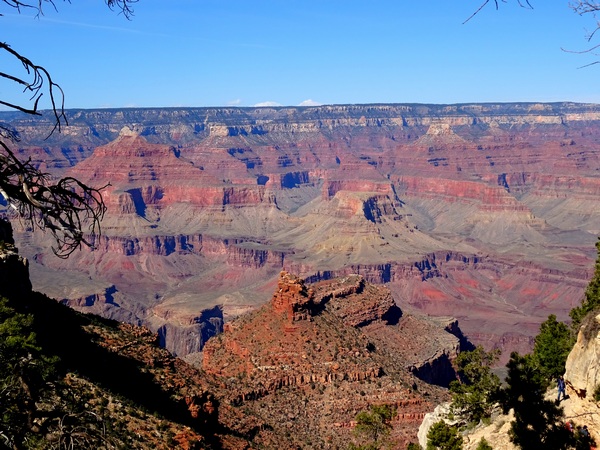 Okay, you earned it. Take one more look. Look for traces of those voices.
Okay, you earned it. Take one more look. Look for traces of those voices.
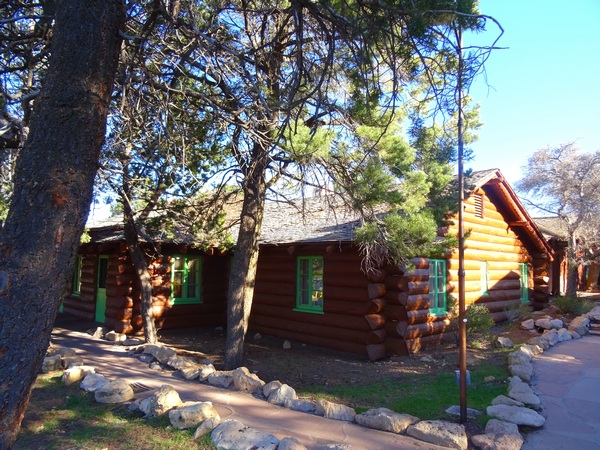
Then it’s off to the Bucky Lodge to freshen up, to soak in a hot tub.
Forgive us if we’re feeling a tad bit tired, and looking a tad bit deranged.
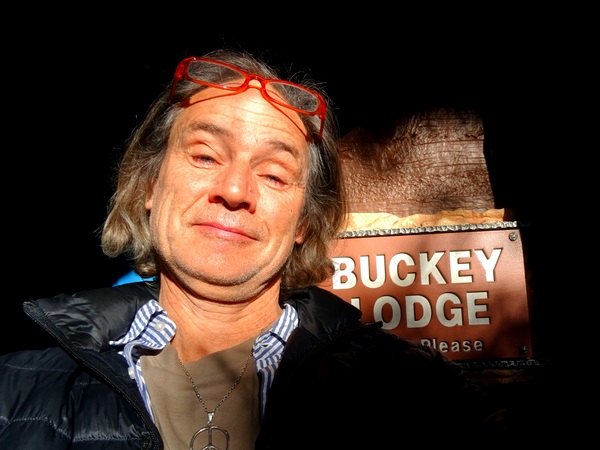
FOOTNOTE: Woody Guthrie wrote over 3000 songs. He was an extraordinarily gifted musician and thinker, and I am in complete awe of him. I hope I haven’t insulted him. I have only tried to imagine his vision in 2016.
I highly, highly recommend, if you aren’t already, listening to his songs. In particular, I’d recommend the “Asch Recordings,” which comes in a nice four-volume boxed set. <- Click.
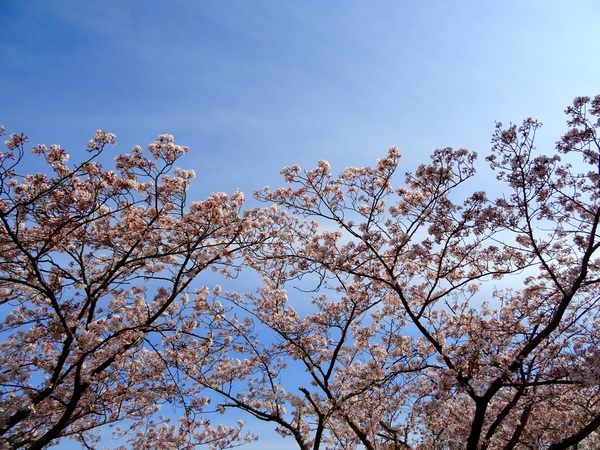 It was close to the end of the cherry blossom season, and we had lots of stuff to do, but we couldn’t pass up the chance to gather at the Mariko River for one last round of hanami (cherry blossom viewing/appreciation/enjoyment).
It was close to the end of the cherry blossom season, and we had lots of stuff to do, but we couldn’t pass up the chance to gather at the Mariko River for one last round of hanami (cherry blossom viewing/appreciation/enjoyment).
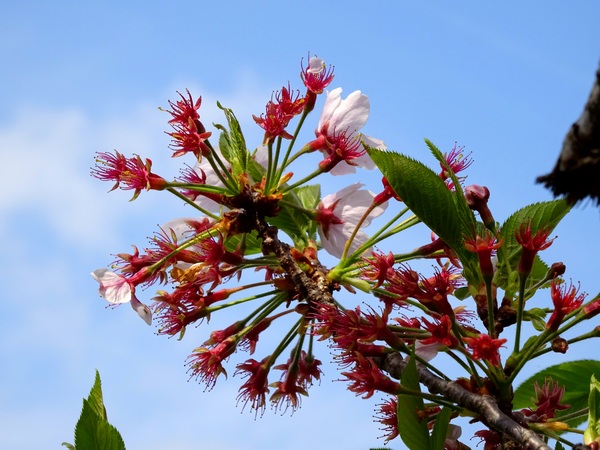
Many of the petals had blown away.
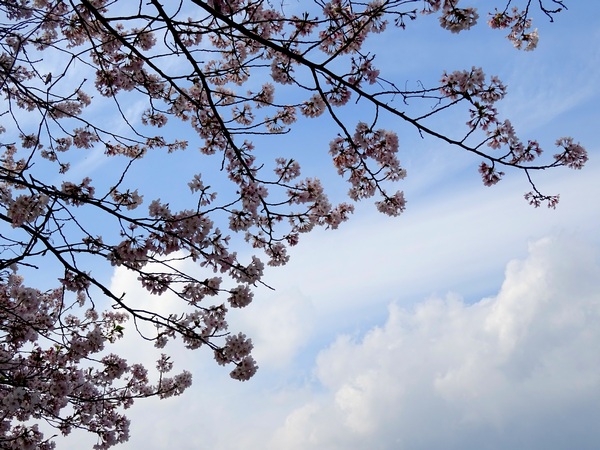
But many had not.
Still, it was a day when you had to admit how fleeting the beauty was—which of course made it all the more beautiful. These blossoms, literally here today and gone tomorrow.
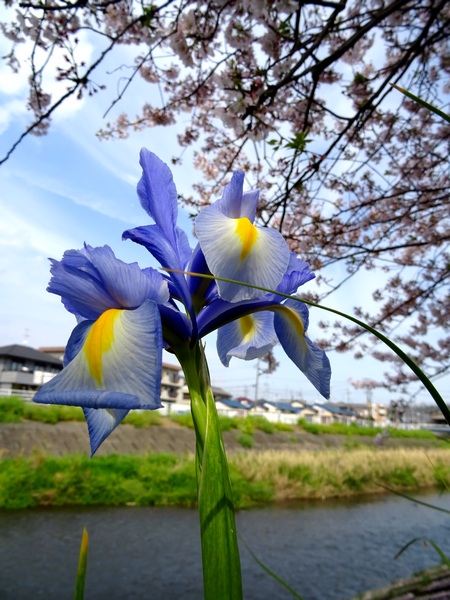
You know that that is exactly what this iris is thinking. He and his friends were so taken with the blossoms on the trees and the blossoms in the wind . . . 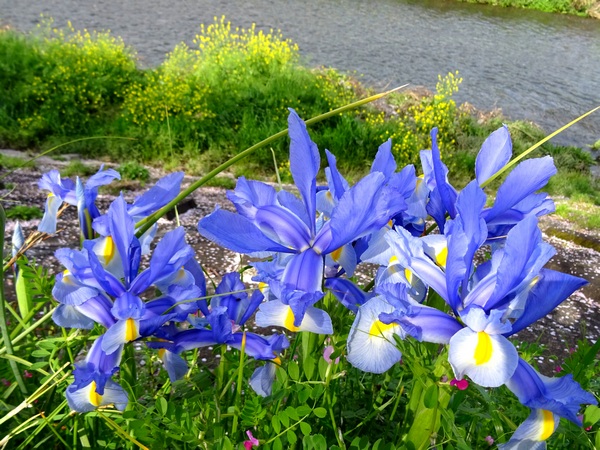
. . . that they danced with joy.
I was so happy that I (with the help of a couple of soon-to-be great musicians) wrote a song. Go ahead and listen. It’s only 18 seconds long.
I know, I know, you may think that I’m hopelessly lost in a romantic dream, but yes, even I am aware that there is often a snake in the garden. 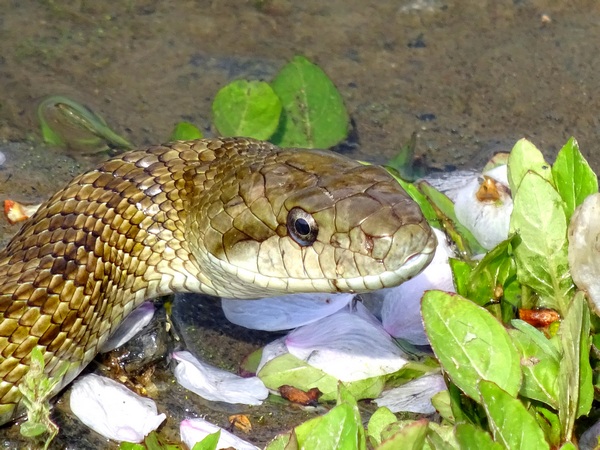
Everybody has their own way of grieving for those blossoms drifting down the river.
But no, I won’t leave you with that image. I’ll leave you with this one.
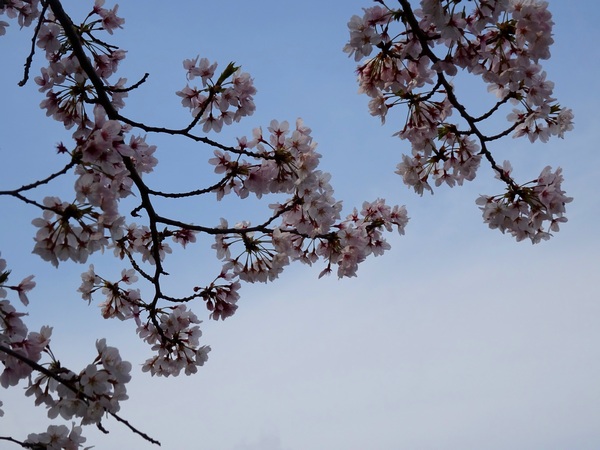
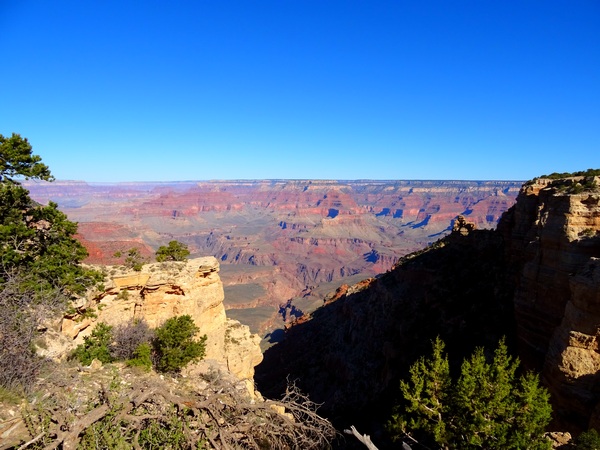 We’d tried to get a reservation at the Phantom Ranch (at the bottom of the canyon and across the river) for months with no luck. They start taking reservations thirteen months in advance and the number of cabins and dorm beds is quite limited, so we weren’t surprised that nothing ever opened up.
We’d tried to get a reservation at the Phantom Ranch (at the bottom of the canyon and across the river) for months with no luck. They start taking reservations thirteen months in advance and the number of cabins and dorm beds is quite limited, so we weren’t surprised that nothing ever opened up.
If you’re an ultra-marathoner you might hike down to the river, six miles or so, and get back up and out in a single day—and not think much of it, but for even the experienced hiker this is a pretty long and tough haul, especially if you decide to take the Bright Angel Trail up and out—Bright Angel being a little over ten miles up, up, up from the river. I can’t even imagine what it would be like in summer, when the temperature might be 115 degrees down in the canyon.
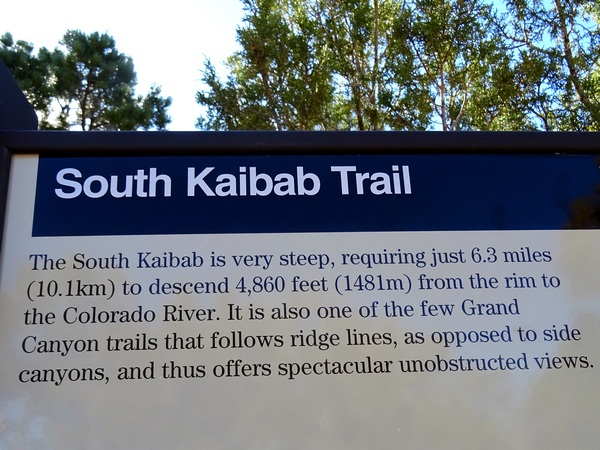
We were glad to be there in March, and just glad to be only the fifth name on the waiting list for a spot at the ranch. If we didn’t get two dorm beds, we would be content going for two short hikes down and up, two days in a row. Amazingly, though, at 7:15 AM the morning we needed to start (if we were going all the way to the river), two dorm beds opened up for us.
So down we headed to the river and the Phantom Ranch.
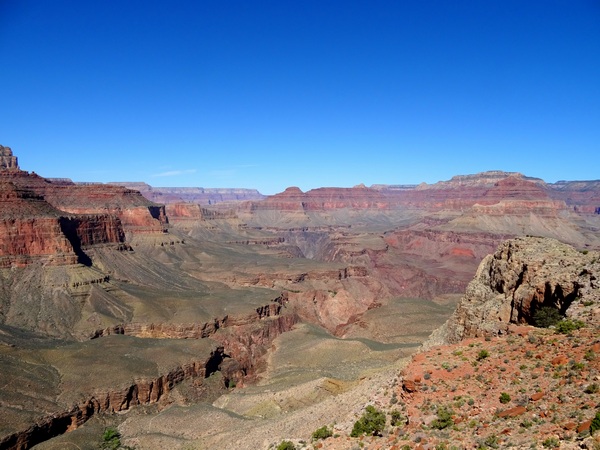
As the sign says, the South Kaibab Trail follows ridge lines and offers constant sweeping views.
We started about 9:20 AM. It was around 30 degrees Fahrenheit.
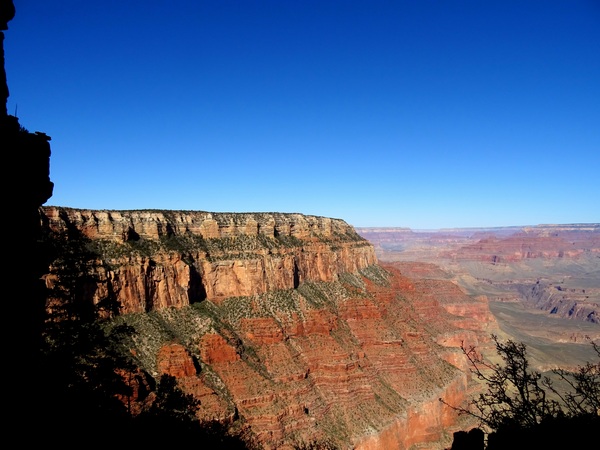
9:30.
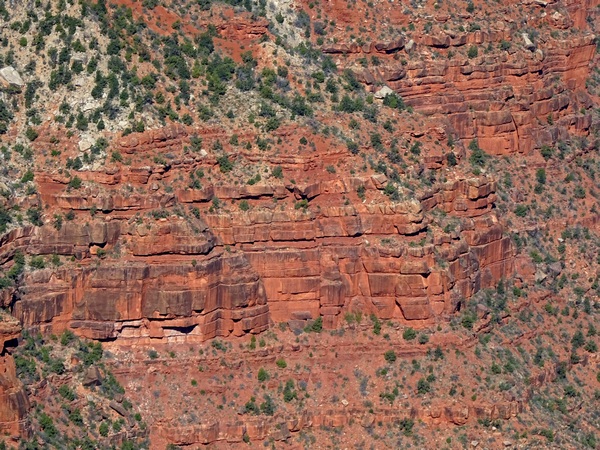
Still 9:30.
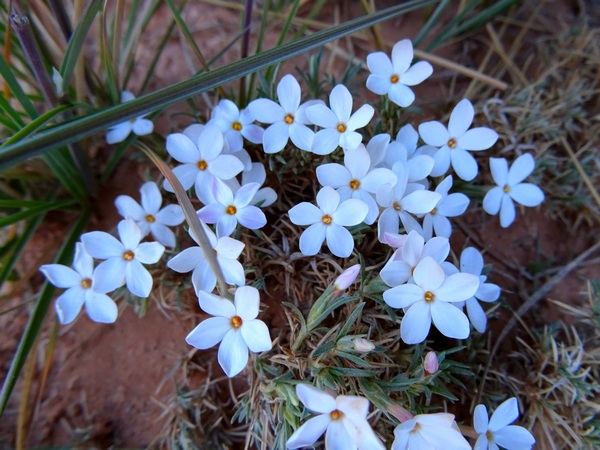 9:38.
9:38.
We got to Ah-ooh Point around 9:45. This is where folks on short hikes turn around. Yes, we aaahed and ooohed.
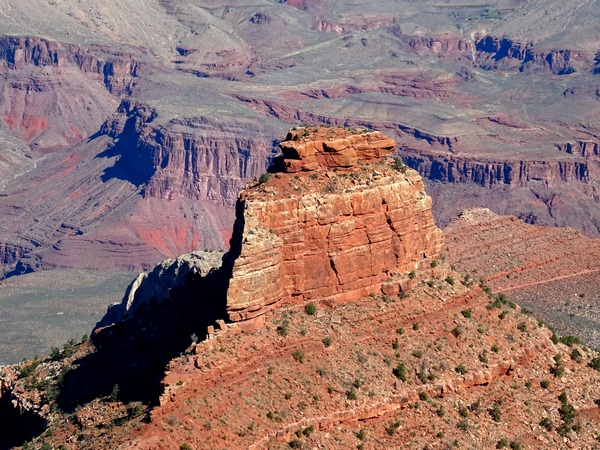
The camera zoomed down on Skeleton Rock. 9:48.
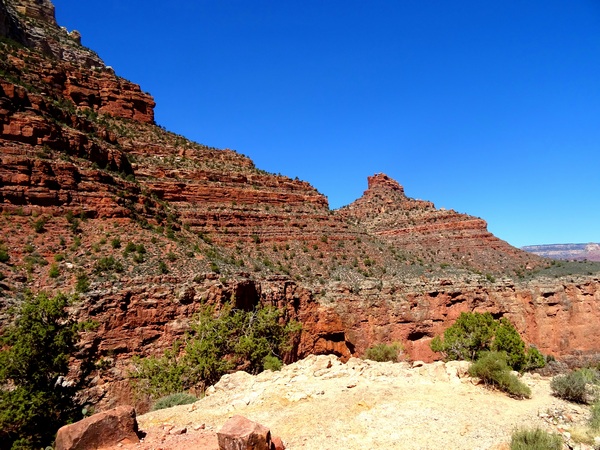
9:50.
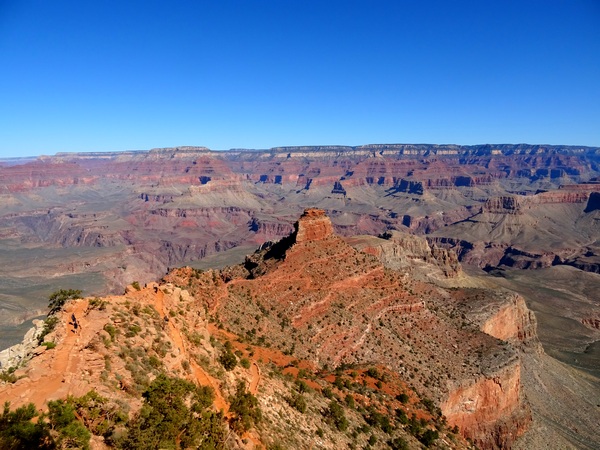
9:55.
Now the camera is not zooming in on Skeleton Rock. Still a long way to get there.
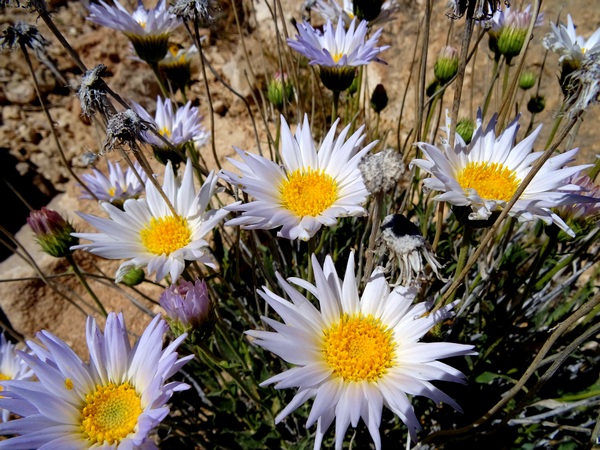
10:16.
We got to Cedar Ridge, another turnaround spot, around 10:20. Cedar Ridge has the trail’s first toilet.
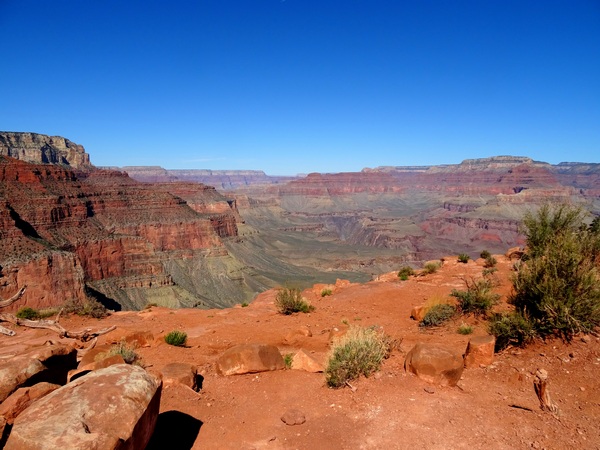
10:28.
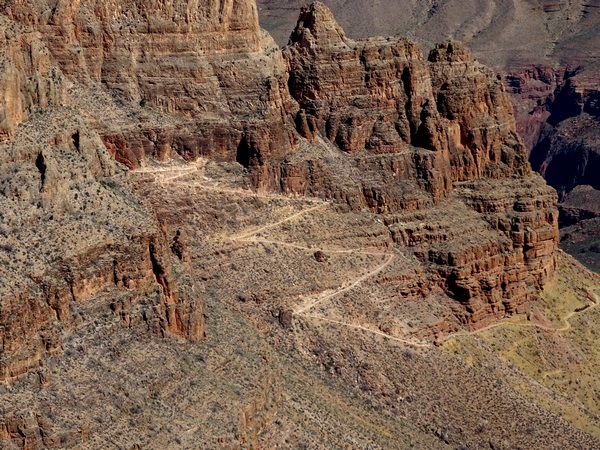
10:43.
Yep. Gotta go down.
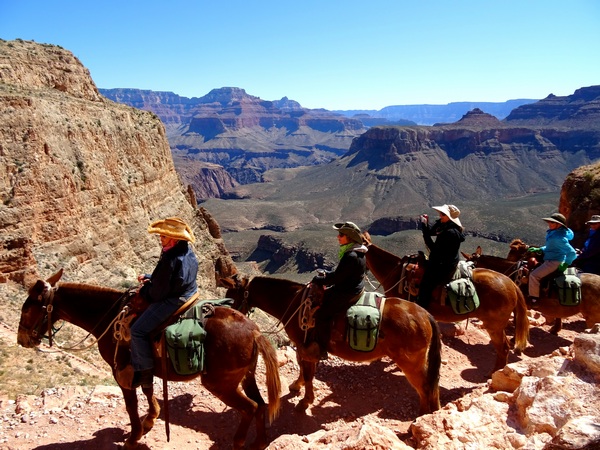
And gotta give way to the mule riders. 11:12.
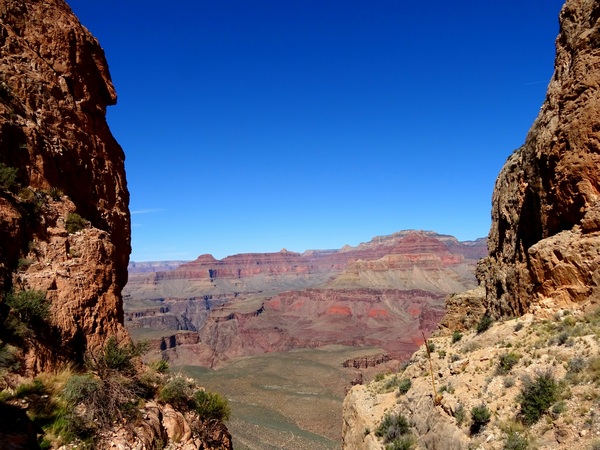
11:14
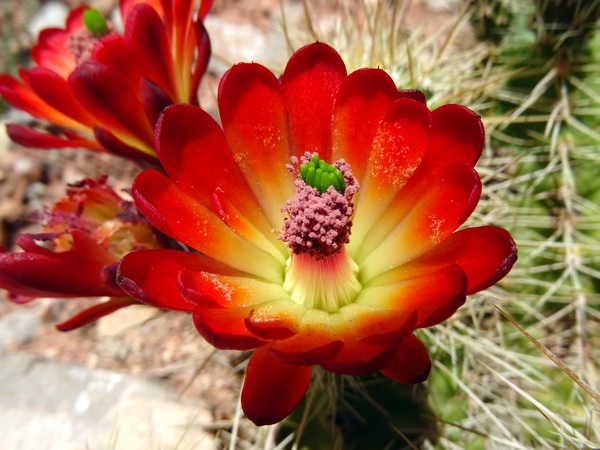
11:18
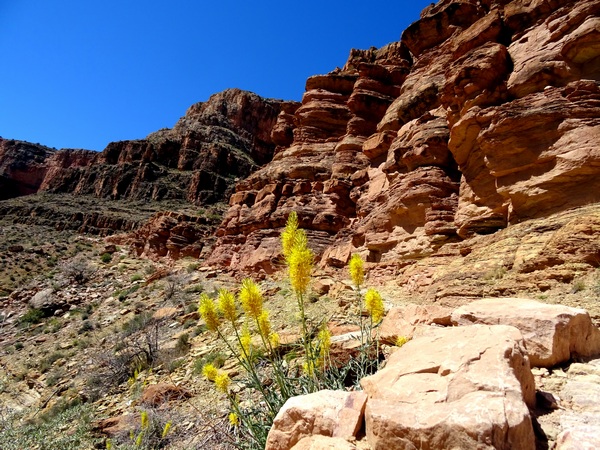
11:38.
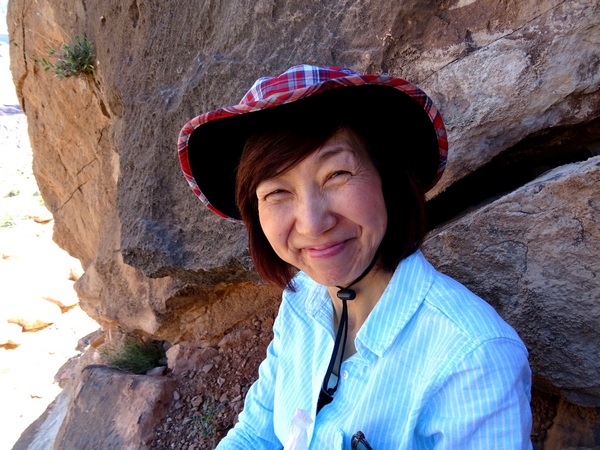
Not much shade on the South Kaibab Trail . . . but found enough for a thirty-minute lunch break. 11:49.
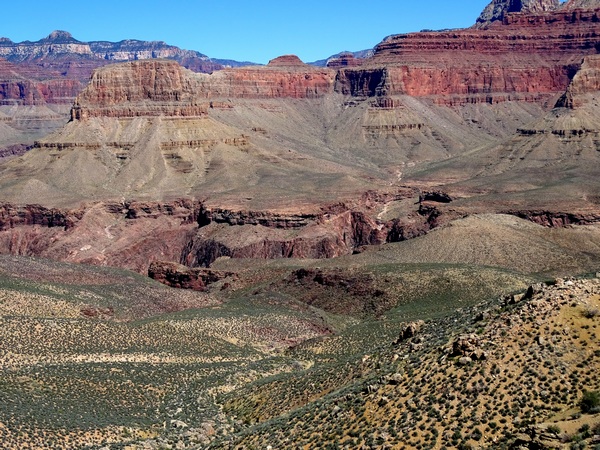
11:51. From the canyon rim, you get a pretty darned good view. The difference, though, between standing at the rim, and coming down this far, is the difference between looking in and being in . . . being in and being able to look all around. This is the difference between, sort of . . . kind of . . . let’s say, studying Japanese culture in a university in the U.S. and studying Japanese culture in someone’s home in Yaizu. It’s the difference between, say, sort of, kind of, studying the white whale in a textbook, or (if you dare) plunging into the ocean and diving deep down to the regions he inhabits.
Hey, I said, sort of, kind of.
Anyway, when you’re in the canyon, its contours roll with every step you take. It’s in motion. It feels alive.
And some people say you can feel a million years with every step you take. Walk six miles and you’ve lived a long time.
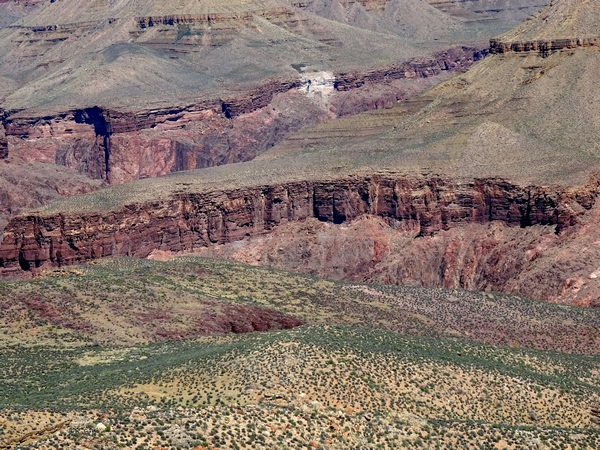
But in the end it’s just the moments (moment after moment after moment) of seemingly endlessly changing beauty.
The light plays a big role, too. We were blessed with gorgeous blue skies.
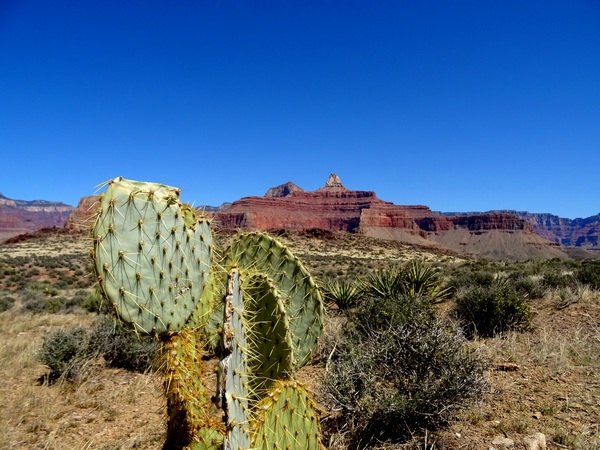
12:34.
It’s cherry blossom season in Japan now. Cool March weather delayed it a bit. But yesterday I enjoyed watching the birds go crazy with all the nectar. One bird, I saw, was in a tree all alone. He looked out and there were those thousands and thousands of nectar-rich blossoms. All for himself.
Down deep on the South Kaibab trail, the number of hikers lessens. You can get into a spot where you seem to be able to see forever in so many directions—and not see another soul. Then you’re just like the bird in the cherry tree. You’ve got it all to yourself. For all practical purposes, it is yours.
Let me repeat that. For all practical purposes, it is yours. The Grand Canyon.
That bird, he looked pretty ecstatic.
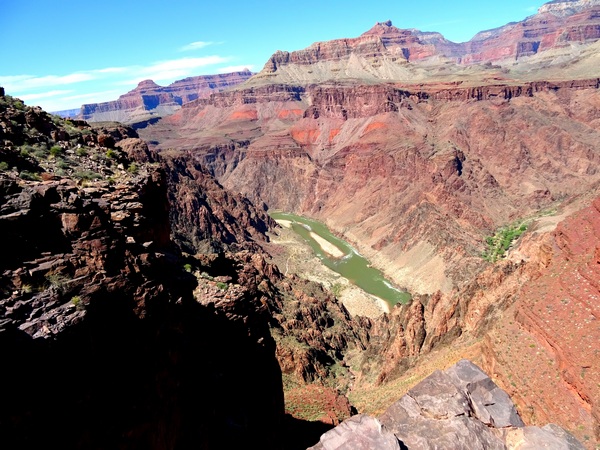
12:38.
First really good view of the Colorado River.
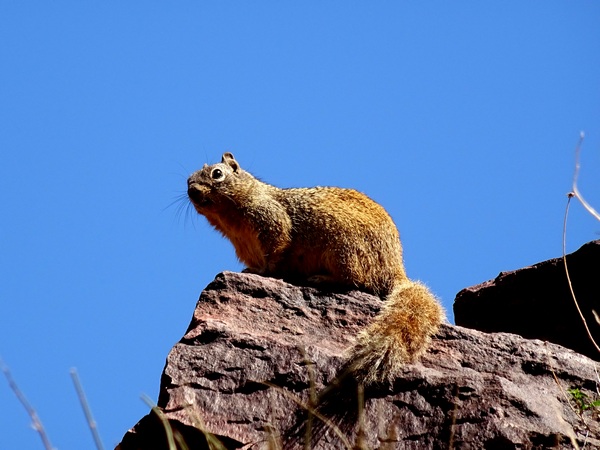
Everybody likes a good view.
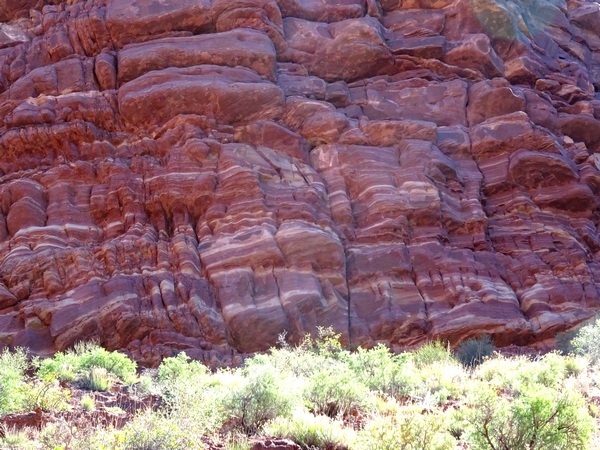
12:43.
You really can feel the energy that molded this great Mother Earth.
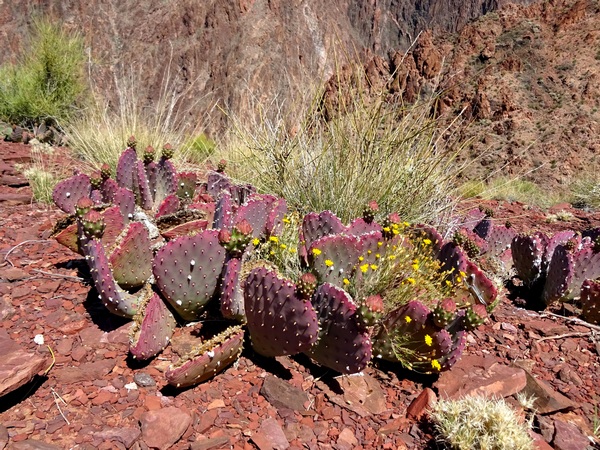
13:20.
The environment is a bit harsh for plants . . .
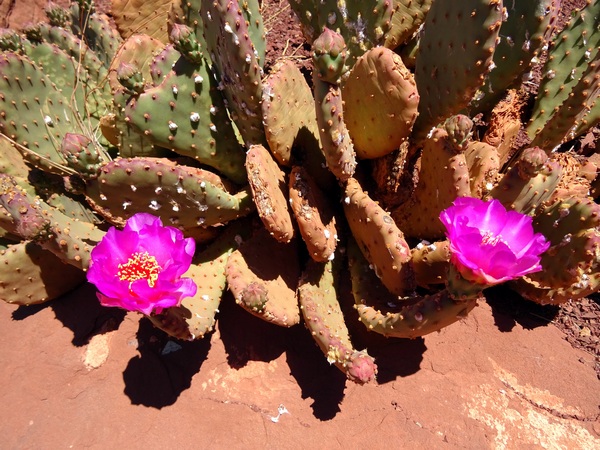
. . . but still there were many blossoming electrically.
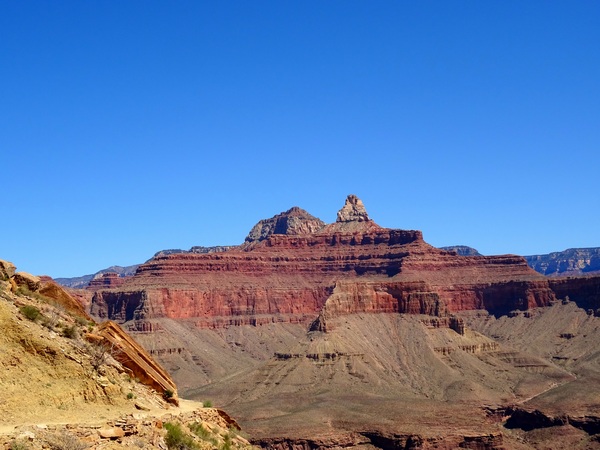
13:22.
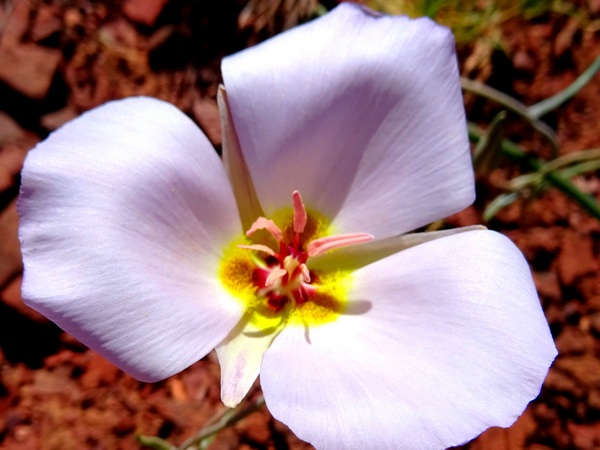
Oh, my. 13:23.
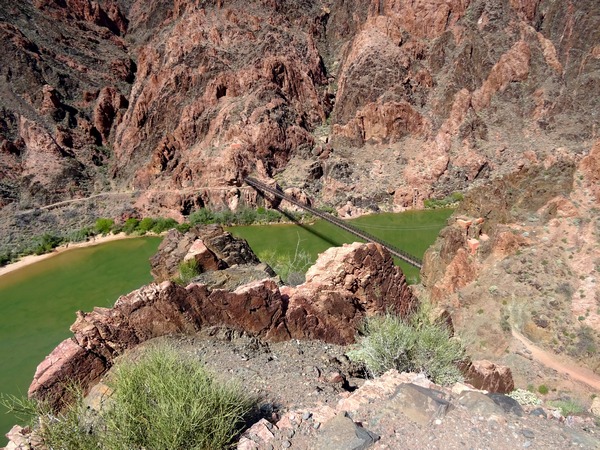
13:45.
The black bridge we’ll cross.
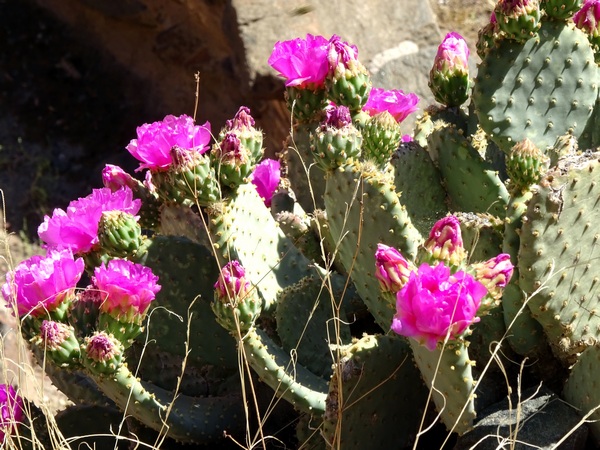
14:05.
Not far from the river bank. About 75 degrees Fahrenheit at this point.
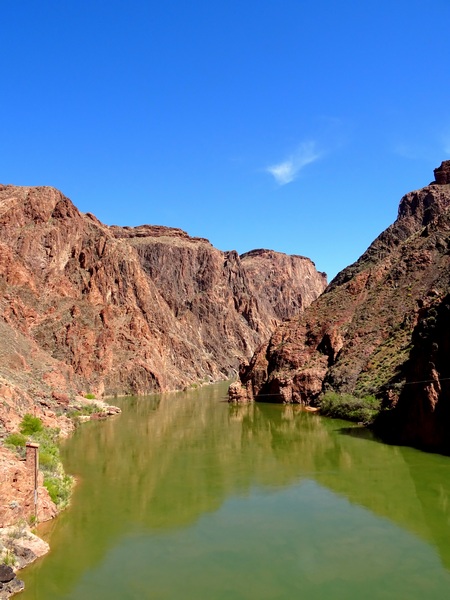
From the bridge.
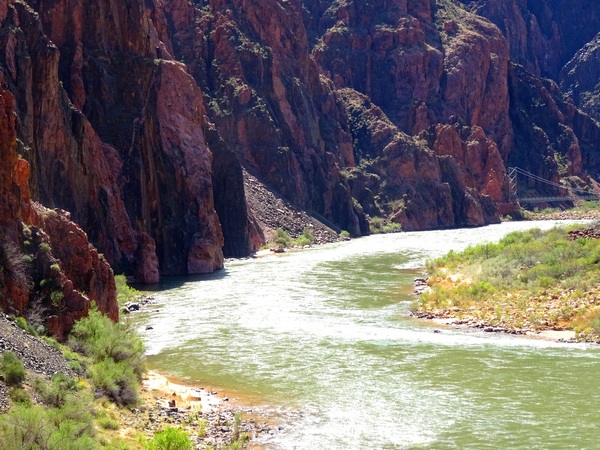
In the distance you can see the silver bridge. That’s how you access the Bright Angel Trail, going back up . . . after a good night’s sleep.
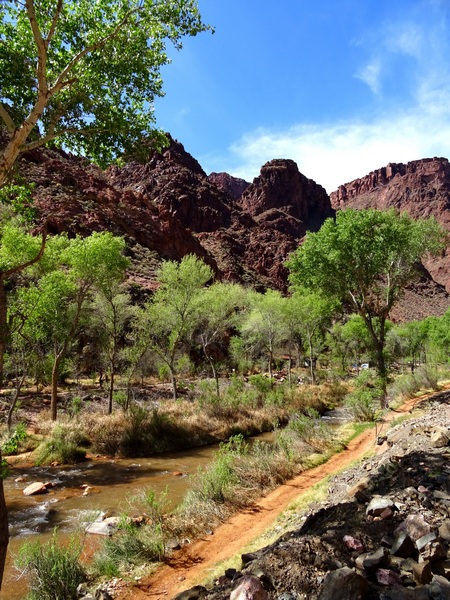
14:19.
The Bright Angel Creek flows into the Colorado. Early 20th century, cottonwoods were planted along its banks—and elsewhere in the canyon. 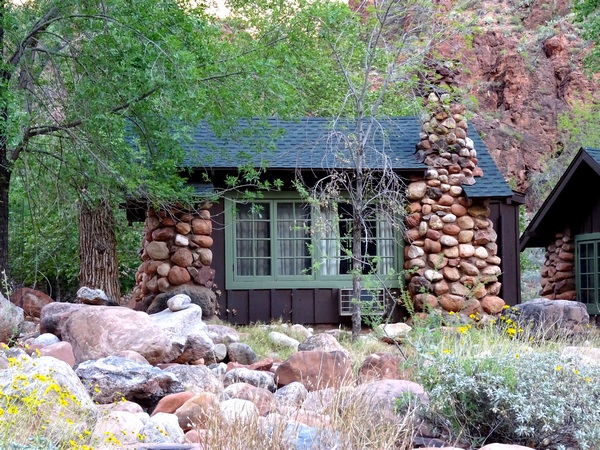
One of the cabins at the Phantom Ranch. We didn’t get one. We slept in the dorms.
Just as Ishmael was given only two choices at the inn in Bedford—chowder, clam or cod—you’ll get two choices at the Phantom Ranch—steak or stew. I can’t speak for the steak, but the stew was great.
But after a five-hour hike, lots of stuff tastes really good.
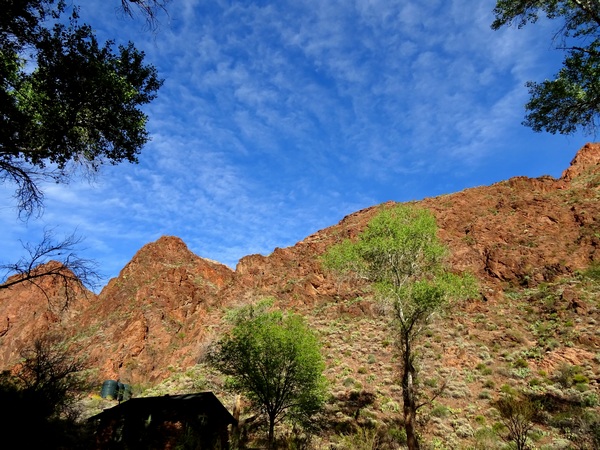
Not a bad place to spend an afternoon. Not bad at all.
